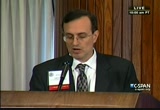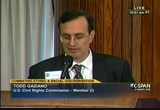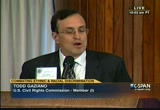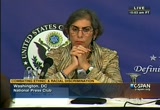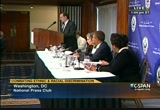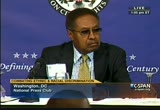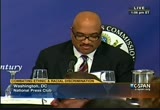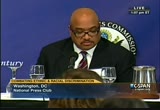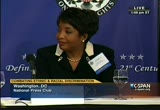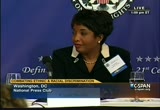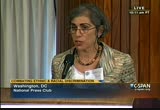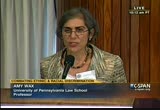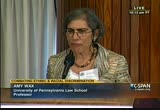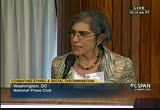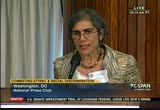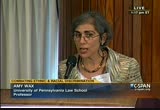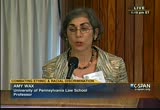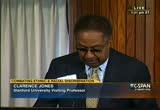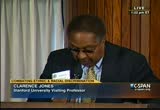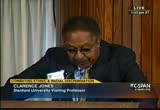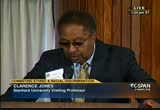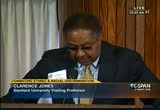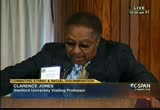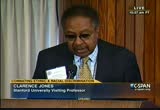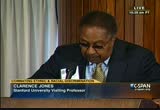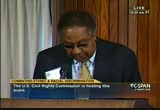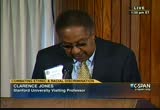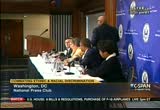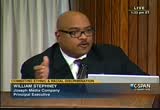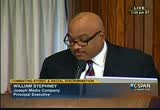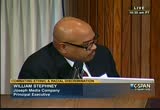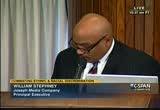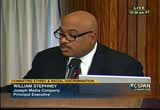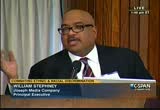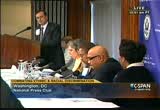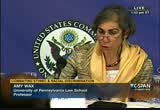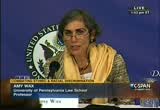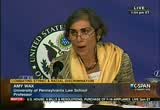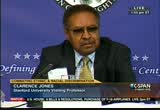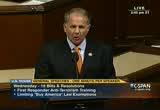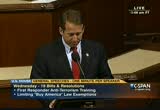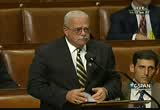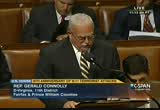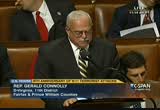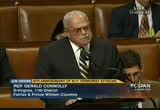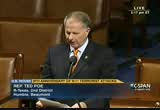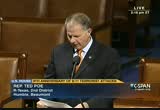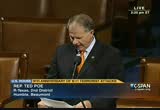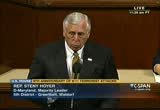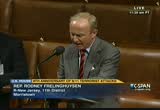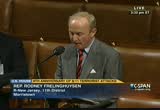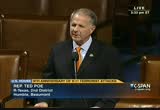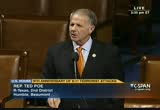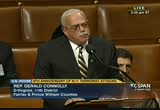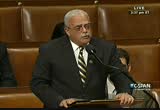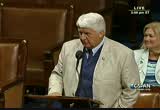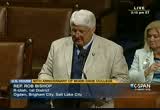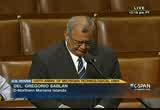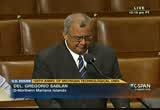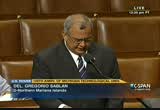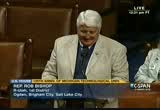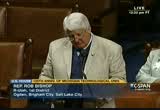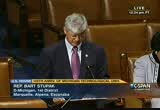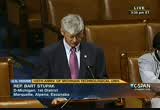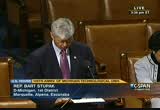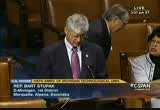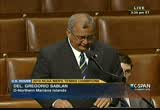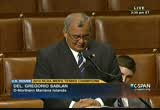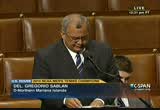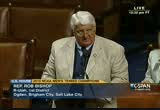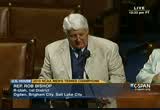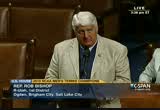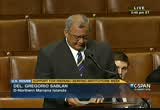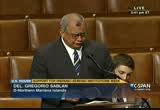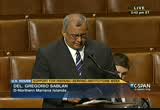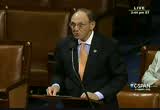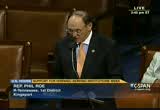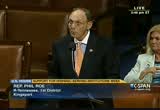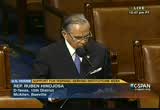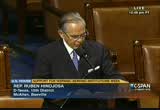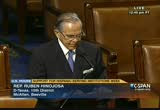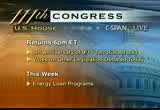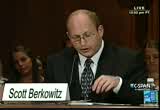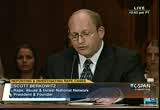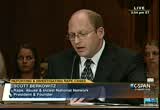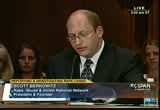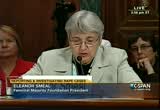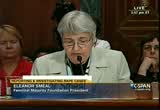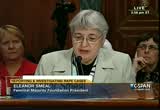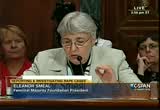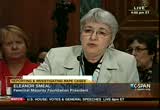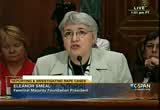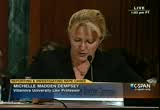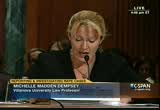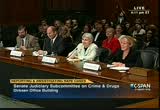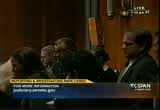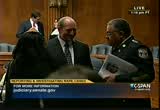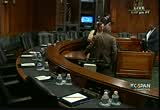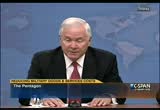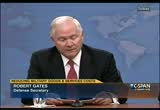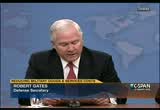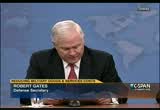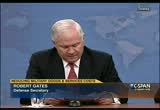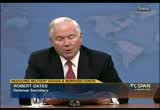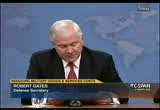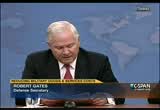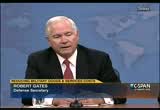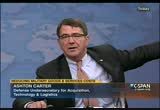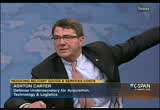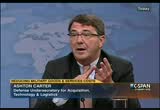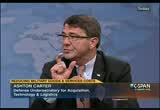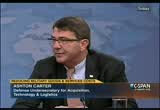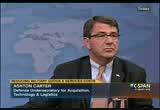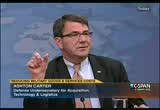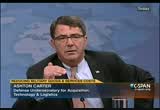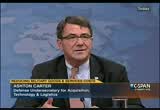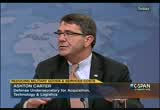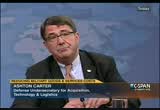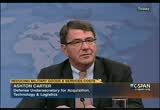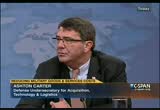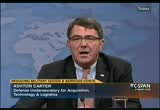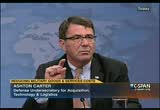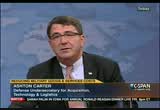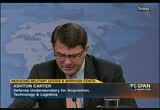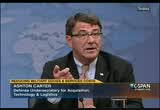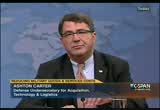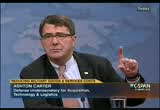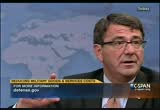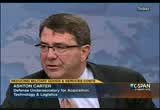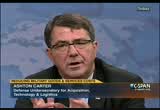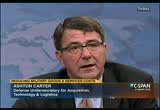tv U.S. House of Representatives CSPAN September 14, 2010 1:00pm-5:00pm EDT
1:00 pm
nominee and polling shows that definitely castle is the strongest republican in the state. long time political player there in the state, first as governor and long time congressman but these are people not from delaware and they are saying i'm not conservative enough but i represented the state for years and they have elected me to that. >> in new hampshire -- >> u.s. civil rights commission is holding a conference on civil rights in the 21st century and includes speeches and panel discussions on various aspects. business leaders and scholars discuss the legal and social tools available for fighting discrimination. >> including continued racial and ethnic disparities in important measures of well-being and success. this discussion obviously includes a consideration of public policy options, both old and new, but it goes beyond
1:01 pm
public policy by also asking about the limits of government action and what the right mix of government and nongovernment action should be. in a pre-conference conference call with the panel members, we identified the following questions as relevant. they don't have to answer them all, but i'm going to repeat them anyway and if they go off on more brilliant things i might turn them back to a few of these questions. first, beyond rigorous enforcement of anti-discrimination law, ca can and should be done by government to narrow racial and ethnic disparities. what can be done by other institutions and what institutions are best suited to the task? three, what role can self-help play in narrowing the gap or is that discussion a
1:02 pm
counterproductive exercise in blaming the victim? four, assuming self-help is an important part of the equation, how is that properly fostered and supported or can it be? now, with regard to the role of public policy, i asked the panelists to consider an additional question, have some government programs unintentionally contributed to racial disparities or the maintenance of racial disparities that existed. and there was a previous discussion and i suppose one subquestion that falls in that category is that even if government policies play an unintended role in maintaining or contributing to disparities, are they necessarily part of the cure? .
1:04 pm
taught several other law school subjects. previous to that she received a medical degrees in harvard medical school and trained in the early 1980's. as impressive as that is, i might skip her digress into molecular biophysics and biomedicine except that it influenced her writing on social welfare and related issues. before she entered the legal academy, she was part of the j.c. circuit court of appeals and worked in the office of the solicitor general of the united states where she argued 15 cases before the supreme court of the united states. she is part of the relationship, family, workplace and labor markets. her most current book, "race, wrongs and remedies: group justice in the 21st century," which was published last spring, is of particular relevance to this panel's topic.
1:05 pm
next we'll hear from clarence jones. mr. jones is a scholar and as dense in visiting professor at the martin luther king jr. research in palo alto. from 1960 until april 4, 1968, he was one of the closest political confidence, advisor, lawyer and draft speech writer for the reverend martin luther king jr. during his years of work for dr. king, he also became the first african-american to become a partner in a wall street investment banking firm, and that enabled him to serve a critical role in the civil rights movement through his effective fundraising support for dr. king in the southern -- and the southern christian leadership conference. jones is the recipient of numerous awards and citations, including the letter of commendation from president bill clinton for his work in birmingham, alabama, in 1963, the isiah award from the american conference in 1996 and
1:06 pm
the shingle award. he's the author of "what would martin say," published in 2008, and his newest book "behind the dream, inside the speech that transformed a nation" is scheduled for publication next year. next, we'll hear from bill stephanie, bill is currently the principal executive for joseph media, a production and consulting firm specializing in media and telecommunications. among his many other notable achievements, of course, i have to point out he is currently chair of the new jersey state advisory commission of the u.s. commission on civil rights. he's a former president of def jam records. i don't know civil rights fact here, president of def jam records, but in some circles, def jam records is probably better known. where he played an important role in the career development of a multimillion selling
1:07 pm
artists, ll cool j, slick rick, third bass. and was part of the music production, the bomb squad. by the way, don't make fun of these if i mispronounce these. and it's i'm old, not because i'm culturally insensitive. the bomb squad, as most of you know, did the work of ice could you be, bel biv devoe, chaka kahn. i know how to pronounce some of these. he was instrumental in shaping the multimedia empire that def jam has become. among the reasons we wanted him to join us today is he joined the firm eli and fincher to serve as executive producer for video games to feature a double
1:08 pm
bottom line strategy, combining profitability with meaningful social impact. their first impact "talkers and doers" is a computer video game franchise developed to encourage entrepreneurship for at-risk teens and young adults. this was the winner of a john d. and kathryn t. mckarter foundation grant and was awarded the innovation and parties patory learning. the talkers and doers game will feature fun and relevant game play. i hope to a lame person like me, too, and will integrate real-world mentors opportunities and resources. he also served on the board of directors at the apollo theater foundation, was trustee of the national urban league, feature in the book "be a father to your child: real talk from black men on familyhood." and last but not least will be
1:09 pm
carol swain. ms. swain is the professor of political science and professor of law at vend are built university. professor swain is also a member of the national endowment of the humanities. among her impressive titles, she also serves on the tennessee state advisory committee to the u.s. commission on civil rights. i have to thank them for their service for our commission. she worked on race relations and representation in congress with her book "black faces, black interests, the representation of african-americans in congress." the book was named one of seven outstanding academic books of 1994 by the library choice journal, received the 1994 woodrow wilson prize. and many other awards. it's been cited by different justices in 1994 and 2003 in cases before the supreme court.
1:10 pm
her more recent books include "the new white nationalism in america," most recently "debating immigration: a collection of 18 essays by swain and other scholars that explore the nuances of contemporary immigration and citizenship in the united states." she's currently working on another manuscript, "reclaiming america's promise." so i will ask them to each limit their remarks to eight minutes. we began five minutes early so we can save time -- a little extra time for audience questions and i am going to reserve the first question for a reporter who i think got the short end of the stick the last two times. i will ask you all to -- you
1:11 pm
can stay in your seats. we'll have a panel discussion first and i'll give you a two-minute warning to come up to the mic. with that, professor wax. >> thank you very much. i'll try to stick to the time limits so perhaps this will have a certain breathless accountability to it. i want to plug my book "race, wrongs and remedies" and many of the things come out of this book. really, my interest in this subject arose from my experience teaching poverty law. i teach about that and race comes up. and immediately i noticed a kind of exacerbating, disconcerting, saneless, a kind of ritualistic approach to the topic of race. and i determined to in effect
1:12 pm
try to build a better mousetrap, break through some of the usually schibilitz here. one that was soar in discussion about race is this accusation of blaming the victim. whenever someone wanted to point out the limits of government programs or policies or services and sought to stress the importance of self-actualization or self-help, the victim-blaming ackuization would be trotted out to effectively stop the -- accusation would be trotted out to effectively stop the conversation. i think this is wrong-headed. this comes in part of my teaching another subject which is remedies. now, there's a very strong ideal in remedies law which is that the wrongdoer, the person that causes the harm has to fix the harm. that's our ideal of justice. and it's an important one. but remedies also recognizes that that ideal cannot always be realized.
1:13 pm
to make a long story short, i think the situation in black america today is that the wrongdoer cannot fix what's broken and here i am talking about white society, the rest of us, those of us what have undeniably harmed black america through discrimination, persecution, slavery and the like. no, i think we're at the point where only the victim can cure himself. i have something in my book called "the parblee of a pedestrian" where i try to illustrate this insight. very briefly, a pedestrian is run over by a truck driver. he injuries his spine. he has to go to a rehab center and the truck driver and his company spay for his stay at the rehab center which is good enough. and the therapist says to the pedestrian, unless you make a huge sustained, strong, painful effort to walk again, you never
1:14 pm
will. the pedestrian says, "that's not fair. the truck driver has to make me walk again. he's the one who harmed me." "but that's impossible," said the therapist, it just doesn't work that way. and i think today for black americans we can say the same. no longer can white society rescue black america. no longer can white society fix what's wrong, fix what's broken. so what is wrong, what's broken. ? i think that centuries of persecution have developed behavior, beliefs and patterns of thinking among the black community that are, frankly, dysfunctional and i will go beyond that and say in my view based on the data that i have seen, and i summarize in my book, those patterns are far, far more important than discrimination presently.
1:15 pm
not past discrimination but present discrimination. and i am not saying that discrimination does not exist. i am saying that discrimination is now a small part of what is holding blacks back. so concretely, where are these dysfunctions? three main areas, and we've already talked about these today, and i'm going to say just a little bit more about them. first, family structure, sexual and reproduction behavior. second, educational underachievement, and then lagging performance on the job. and third, criminalality and breaking the law. family structure. we've already heard a lot about this. the usual story on the street, and in academia, is that the breakdown of the family is an inevitable outgrowth of the current economic climate. the disappearance of working class jobs. we have to move the economy. we have to remediate this by changing economic conditions and that is the only path to
1:16 pm
reweaving the family. i suggest that when we look at the data that just doesn't pass the smell test. we can look cross-sectionally and we can look longitudinally. cross-sectionally, we can say whether a man holds a job or not. and we look at cross-ethnic groups, we see that blacks marry at far lower rates up and down the socioeconomic rates. less educated blacks marry at much lower rates. this is not economics, folks. this is behavior. this is culture. look back over time. harry holter makes out like every working class man had great job 50, 60, 70 years ago. i know for a fact that's not true. people of very modest income and prospects half a decade ago
1:17 pm
or more were married at much, much higher rates in all ethnic groups. having modest economic prospects does not inevitably lead to the breakdown of the family. indeed, quite the opposite. today and in the past when people who have less education and have working-class jobs join forces and marry and get together and stick together, they improve their economic prospects. and people like robert learnman at the urban institute have shown this statistically to be the case. what about educational underachievement and lagging on the job? well, the black-white test score and performance gap is well-known today and has been amptly documented. but here's an important insight. the black-white achievement gap doesn't stop at the schoolhouse door. it translates over into job performance.
1:18 pm
all right. and that has consequences for how much people earn and their advancement on the job. now, if you look at the industrial psychology literature, as i have recently had occasion to do, here is an unpleasant fact. blacks lag in job performance on both objective and subjective measures by about half a standard daveiation across most jobs. even if they have the -- daveiation across most jobs, even if they have the same number of years of education. why is that? because years of education don't tell the whole story. you have to control for other addition of human capital which is how much the person has achieved, what their aptitude is, what their test scores are, what they learned in school, and we know that there are racial gaps in what people learn in school and the human capital that they bring into school, even the same schools. ok. we cannot account for this by saying that blacks go to worse schools, although on average
1:19 pm
they might, because this achievement gap exists within the same schools. ok. and it exists among of a lieutenant blacks and less -- affluent blacks and less affluent blacks. this happens at all income levels. there is something going on here that i just think economics and quality of schools and externals cannot account for and i call that outlook, attitudes, culture. now, i submit that the government can do virtually nothing to change these things, that this is not something that the government can effect. she is saying end here. so let me just end up with one point. there is a world of difference between helping people who are less well-off and utterly transforming their behavior. we have an outsized faith now
1:20 pm
in social engineering, in changing the fundamental way that people are through government, through programs, through services. this cannot be done. i know that it's childish to jump on the harlems children's program, which is a wonderful program. the harlem children zone, i guess it's called. but what are we trying to do here? what we're trying to to do is impossible. we have a crash program to turn children into constructive citizens that entirely replaces the family and says we need to rebuild children from the bottom up because the traditional structures and institutions that are doing it are failing us. and i say that's impossible. all right. no institution can come in and do what these traditional structures have failed to do. all right. we cannot find enough warm bodies, enough dedicated people to, you know, to enter our lives and transform individuals
1:21 pm
ab ovo and replace the family. thank you. [applause] >> first of all, let me say publicly that chairman -- this commission, chairman reynolds and the commission should be congratulated and really applauded for conving this -- for conving this conference. [applause] with all due respect to the various conferences that takes place, the naacp, the national urban league, the southern christian leadership conference, and meetings that take place, particularly in the summer, this conference today at this place on this subject may be the most important
1:22 pm
conference to take place in the 21st century. now, senator gustin said many years ago, hope has many daughters. anger and courage. anger to see how things are and courage is they don't remain where they are. yes, brother, raspberry, the stream is crossable. the stream is crossable, and you were right to summon us to buy a ticket, not just wait for the loto. -- lotto. 1857, fredrick douglass said many things but one of the things he said at a convention in upstate new york, i just want to quote that for a moment, he said qurks the general sentiment of mankind is a man that will not fight for himself when he has the means of doing so is not worth being fought for by others. for a man who does not value freedom for himself will not value it for others.
1:23 pm
or put himself to any inconvenience to gain it for others. the whole history of the progress of human liberty shows up at -- that all concessions have been born of earnest struggle. if there is no struggle there is no progress. power can seize nothing without a demand. it it never did and it never will." two philosophical concept percepts deeply embedded in the historical development of our nation are relevant to the issues being considered at this conference. one celebrates the power of the individual to develop his or her innate talent or human capital, to pursue life's opportunities through committed individual stick to itedness which can result in person and business success. the other, following the institution of slavery, its subsequent political and economic consequences suggests that whether business or economic success will result from the committed personal
1:24 pm
application and development, one's individual talents or human capital by those whose ancestors were slaves may be dependent on the for tuesdayties advantage of either the receipt of third-party wealth and the conscious intervention of a variety of government persistence. 47 years ago last month martin luther king jr. summoned the conscious of individuals to live up to the percepts enshrined in our declaration of independence. you know what he said. he said when the architects of our republic wrote the magnificent words of the constitution, declaration of independence, they were signing a promissory note, a note that all black and white will pursue -- life, liberty and the pursuit of happiness. he reminded us that america has defaulted on this promisory
1:25 pm
note insofar as citizens of color are concerned. america has given the negro people a bad check, a bad check that has come back marked insufficient funds. but he said, "we refuse to believe there are insufficient funds in the great vaults of opportunity of this nation, and so we've come to cash this check, a check that will give us upon the man the riches of freedom and the security of justice." we've come to collect 350 years of poker chips. he believed that liberating the negro of child slavery in 1863 and then expecting him to compete overnight in the free market was a symptom of depraved absurdity because nothing ever was done to counterweight the fact that by law the black man had been kept illiterate and penniless, worse at the very moment that free slaves were discovering 40 acres on a mule were no more real than the check in the
1:26 pm
mail. the army was clearing indian lands and the federal government was asking both white citizens and european immigrants to come and grab what they could. the black man had been brought here against their will but was not offered in any place in america. freedom for the negro was freedom without eat or land. you know this past spring semester at the request of the faculty of the graduate school of continuation education at stanford university, i designed a syllabus and reading list required for students seeking a masters degree of liberal arts. the course was captioned "from slavery to obama." graduate students who enrolled in that course collectively suggested that the absence of any generational transfer of wealth with compound interest from emancipated slaves to their successor families of african-americans after slavery had created a systemic economic and financial disparity between
1:27 pm
current frarne communities and the majority white population. they concluded there had been no economic redress for the consequences of slavery, originally contemplated by the 39th congress when they said 40 acres on a mule. so none of this was provided to the newly 'em emancipated slaves and their generation of families. as one of the speakers, i think mr. paterson speaking about lyndon johnson, he said, at a commencement speech at howard university, you do not take a person who for years has been hobbled by chains and liberate them, bring them up to a starting line of a race and say you are free to compete with all others and to say you have been completely fair. this is the next stage for a battle of civil rights it is not enough to open the gates of opportunity. he said. president johnson asked his
1:28 pm
audience to pay special note of what he referred to as a breakdown of the family, particularly in low-income communities. johnson's speech has had been incorporated from some of the findings of then labor secretary -- assistant labor secretary patrick moynihan. the negro family, the case for national action. and i think it's important to take a moment to quote some of what was said. he was talking about 1965. in this new period, the negro american, will go beyond civil rights. they will expect in the near future equal opportunities for them will produce equal results as compared with other groups. this is not going to happen. nor will it happen for generations to come unless a new and special effort is made.
1:29 pm
this is what he said. a family structure, the evidence, not final but powerfully persuasive, is that the negro family in the urban ghettos is crumbling. a middle-class group has managed to save itself but for vast numbers of the unskilled, poorly educated city working class, the fabric of conventional social relationships is all but disintegrated. measures that have worked in the past or would work for most groups in the present will not work here. a national effort is required that will give a unit of purpose to any -- to the many activities of the federal government. this, of course, all represented the effort of the federal government to the ideological basis for the remedial program, a base called
1:30 pm
affirmative action. chairman reynolds said in his letter, "we have reached a critical juncture in civil rights that suggests an open and frank discussion about lingering judgments." the classic definition of insanity is a repetition of the same course of action and anticipation of a different result each time, such action is limited. the magnitude of the several of the issues and problems that extend within our communities requires the fresh air of realism, predisclosed ideology must be based on the idea of practicing mat tism. if you people that the tenure of teachers in public school who turn out year after year an inferior work product of students and basic writing, language and math skills is sacrosanct, this is insanity. doing the same thing year after year but expecting the
1:31 pm
different result. this may be functionally irrelevant to suggest the problems substantially but -- due to past generation under class discrimination. past conventional approaches to civil rights are not responsive to the current realities of problems confronth our communities eye department find by patrick moynihan. thus, the principle civil rights challenge of the 21st century is a commitment to the pursuit of educational excellence and a greater assumption of personal responsibility for conduct that creates adverse, social and economic pathologies in our communities which diminish the opportunity for effectively competing in the larger society. [applause]
1:32 pm
>> good afternoon. you gave him much more love. let's try it again. good afternoon. >> good afternoon. >> i served with him on the board of the national fatherhood initiative way back when about 10 years ago. i thought his comments from great. it's been amazing to watch your growth, brother, actually over time. fantastic. of todd -- when running down my background, actually sort of made me scratch my own head of why am i here, you know, amongst the distinguished gathering of theorists, academics, you know, public
1:33 pm
intellectuals and in essence i spent most of my life in media, in popular culture. there used to be a segment on "sesame street," one of these things are not like the others. >> give us the answer. >> i'll give you a "sesame street" level sort of answer to -- in keeping with who i am and what i do. so, you know, i absolutely applaud chairman reynolds, you know, for his vision, for this conference which i echo the statements of mr. jones. i think this is historic because from what i understand, because i've been taking my notes in the back, that sometime in the 1960's there was a study about black families and then all of a sudden people decided not to talk about black families. so as far as i know beyond some of the good works on fatherhood
1:34 pm
in terms of a public discussion of family structure i think this is actually one of the first national efforts that we've ever had. at least from what i'm getting and gleaning from our conversation today. so i've been a prepared stupet for the intellectual and academic discourse. so once again i'll try and figure out why chairman reynolds would invite me here to address everyone other than for the fact that after 25 years of working to essentially help destroy contemporary culture that, you know, that basically i'm here to help. [laughter] now, there are numerous definitions of culture. in keeping with what i do, i went to the computer at wikipedia. and there was one from miriam webster, the customary beliefs
1:35 pm
of a racial, religious or social group, the characteristics and features of everyday existence as diversions or a way of life shared by a people in a place or time. further, there is another definition for popular culture. popular culture commonly known as pop culture is the totality of ideas, perspectives, attitudes, means, images and other phenomena that are deemed preferred and in consensus within the mainstream, especially western culture of the early to mid 20th century. and, you know, in thinking about civil rights and how we've gotten to where we are today, how i've gotten to where i am today, given the fact that i was born to two african-american parents in the early 1960's prior -- married, by the way, prior to the moynihan report, who upon their marriage and wedding for their honeymoon drove from new york to california for their honeymoon and stayed in in
1:36 pm
segregated hotels. i was conceived literally within segregation. and some two years after my birth, two or three years we wind up getting, as i've heard throughout the day, the report that our families were in crisis. you know, some 45 years ago. you know, it's interesting from my advantage point having grown up during this crisis of the negro family to sort of analyze the changes in culture. i think that many of those changes were probably affected by family structure consistent with what's been discussed today. that affects everything. it affects film, television, music, you know, i think about as i look at our backdrop, a new era defining civil rights in the 21st century, i think about civil rights in the 20th century. and i think about how the civil rights movement during the mid 1960's had a soundtrack.
1:37 pm
we shall overcome. in our business we would call that a main title theme. like when you're watching a movie and you see the credits at the beginning and then you hear a song, that's usually the main title theme. so we had incredible main title themes that were informed by the politics of the day. culture impacts politics and politics impact culture. we don't separate, i don't think. that's not been my experience. but now, you know, having worked closely with many young rappers and musicians during the past 25 years, i cannot overstate the amount of emotional and psychological damage that has been done to young men and women but especially our young african-american men who've grown up not only in fatherless households but also in essence what our fatherless communities , male, adult maleless communities. neighborhoods devoid of men. family structure, i believe,
1:38 pm
abhors a vacuum. hence gangs provide a perverse safety net for young people left without structure. young men seem to have no faith in their own human potential and in their capacity to successfully navigate life. so they adopt a lifestyle and formed by the values they developed solely on their own in the hood, quote-unquote, and without parental input and/or authority. you know, one of the most famous rappers of today has become almost a billionaire. he made money off of endorsements, but his first c.d. sold millions. made tens of millions of dollars for the company that he records for. the title of his debut c.d. was "get rich or die trying." so, you know, you perform a juxtaposition. you think we shall overcome in the mid 1960's. prior to the literally
1:39 pm
destruction of family structure within these communities. and you fast forward some 45 years later and you have young men who are rhyming and singing "get rich or die trying." and unfortunately most perform the latter, not the former. and our young women have been terribly affected by fatherlessness and family structure difficulties. many of our young women have no conception of adult male parenting which to them is abstract at best. and nonexistent at its worse and it often results in those young women engaging in unhealthy relationships with multiple men and a distorted view of the relevance of men to themselves, to their families and to their communities. now, after all of that, how do we turn all of this around? i know how to destroy, but i'm not so certain on how to build other than i tap in perhaps, into my own experience right
1:40 pm
now as a married father with three children. just as quickly -- and very quickly as a married father, as a married african-american father who moved his children from a school district where 600 kids attended the public school in which i had my oldest son on back-to-school night six parents showed up for the 600 kids. i moved to the suburbs into new jersey -- and i'll be quite frank. into predominantly white suburban, upper middle-class school district. and on the back-to-school night in that district, not only was the main room filled, but there were two overflow rooms that they had to stream video. in fact, it looked like the first week of "avatar" opening. that's how crowded it looked. i'm not sure that government can negotiate or provide
1:41 pm
anything for that disparity, but i know what government can do. it has a bully pulpit. and it it has the ability to engage us in conversation. has the ability to spur conversation, and, you know, even in the instance of what we're doing here, bring us to a point where we're melting, you know, the ice that we've had on the discussion for family structure. so i thank you very much for your time and have a great conference and convention. thank you. [applause] >> good afternoon. >> good afternoon. >> it's showtime and my teleproferter is broken and i don't know how i'm going to do. but i want to thank chairman reynolds and the members of the
1:42 pm
civil rights commission for inviting me and the remarks that i intend to present. may be a little bit different than what we've been discussing, but i think they are important. so to my notes. it's obvious by now that the civil rights tools that we've used for the past 40 years have not worked very effectively. and there have been some successes, many of them have benefited the middle class. i mean, programs like affirmative action, they have helped build a large black middle class, people that affluent. it has helped the hispanic community. it's helped white women. and if you were to look at the history of affirmative action, you'd see that the program, you know, by 1970 there was something like five groups that were covered by race-based
1:43 pm
affirmative action, and these are groups that did not have the history of african-americans. the part of the community that i come from, i was born in the rural south. i'm one of 12. we all dropped out of school. i have a g.e.d. everything i've accomplished has been under those adverse circumstances, and, you know, i don't have time to explain to you why me, why i got out. i was the only one of the 12. i'm -- i'm a firm believer that in purpose, in god, and i think doors were opened up for me and i had the opportunity to see life at the bottom, to see it now as a person that's strongly part of the middle class and to have taught at princeton. i was tenured there. i see how the system works. i see how it doesn't work. and i see the deception. there's deception everywhere. and that's unfortunate. and it's true that the definition of insanity is doing
1:44 pm
the same thing over and over again and expecting a different result. and i think that we do that too many times. and even here today, we're talking about civil rights, and civil rights in the 21st century has to be about more than race and race-based remedies. it has to address discrimination, but also be geared toward solutions that will impact the masses of poor whites, blacks, legal hispanics, members of other groups that are trying to get a strong hold on the american dream. and it can't be just about the black underclass, the people you were talking about were people in my family. i mean, they have their problems. there are things that i believe that we can do to reach people that are in that unfortunate situation, but whatever remedies are and approaches we take going forward has to be geared around helping
1:45 pm
disadvantaged people, not one particular group. civil rights in the 21st century has to encourage people to see themselves, not as outsiders, but as americans, and they need to have that can-do spirit that many of our ancestors have had. and i think about myself that i come from, you know, part from a social class, part of the country where as soon as you open your mouth and people hear the southern accent they immediately begin to make assumptions about your i.q. and i've always had an i'll show you attitude, and so people underestimate me all the time and, ok, part of my -- ok, underestimate me. but i've seen that as a challenge that i would -- i welcome the challenge. civil rights is about black people. civil rights is about white people, brown people, yellow people, red people coming together to tackle the
1:46 pm
perennial problems that have plagued this nation. problems that have not been ameanable to any of the existing programs and experiments. progress towards common goals will require new approaches and it will require strategy that combines self-help with private initiatives and carefully targeted and tested governmental programs that are geared towards the most disadvantaged americans. again, these are poor whites, these are blacks, these are legal hispanics, these are members of other minorities that are in this country that have fallen behind. it will also require a strong immigration enforcement. it will also require strong immigration enforcement. it will also require strong immigration enforcement. i'm sorry. the teleprompter was stuck.
1:47 pm
[laughter] it will require an investment in native-born human capital in the form of occasional educational opportunities for the noncollege bound. not everyone belongs in college. when i started college, i started -- i got a g.e.d. in 1975. i started a community college. i did well at that community college. that got me into the next college. that got me into the next college. not everyone belongs in college and not everyone wants to go to college. it has nothing to do with their i.q. we need to have strong vocational programs in the high schools. and we need in the communities where all of these people are unemployed that are older in their 40's and 50's, we need programs to retrain these americans to do jobs that americans will do. our country has changed in dramatic ways. consider that by the year 2042 it is estimated that america will be a majority minority nation with nonhispanic whites
1:48 pm
and blacks constituting decrease in percentages of the population. hispanics and asians will be the fastest growing groups. some of these newcomers are not in the country -- some of them are in the country illegally. some of the -- some of them are not in the country legally. many of them are poor. they compete directly with poor whites, blacks, hispanics and legal immigrants for a dwindling supply of low-wage, low-skill jobs. civil rights in the 21st century cannot turn a blind eye to the rule of law. many of the newcomers come from nations where there is no rule of law. and what kind of example do we set as americans when we don't enforce our own laws? we have an opportunity to say that we are different. you know, this is a nation of laws. we are not doing that. we're setting a poor example. and we ought to be ashamed of ourselves. civil rights also has to be about the white community and
1:49 pm
the white community not filling agrieved. and while we struggle with the continuing struggling problems of blacks, white people struggle with the racial dialogue in america. i'm sure people watching c-span or wherever they are going to see this will turn off the tv. it's like same old same old. it's like we never get beyond this. last year i received an email from a white woman who identified herself as jewish. i will call her -- i will call her -- you know what i'm trying to say, adassa. and made a plea to me to abridge racial differences by servings a a bridge builder she wrote, i never harvested any racial thing except affirmative action, the myriad attempts by liberals in government to make life unbearable for those of the white race. such as forced integration, forced busing and the white
1:50 pm
neighborhood. i have people in the asian neighborhoods -- race mongers, such as the naacp, hatred against your people has heightened to a level i have never been seen in my half cently of life on this -- century of life on this earth. and i wonder if fair-minded persons like yourself can help this in some way. it seems you have indeed been trying. i have tried to do the same within the jewish community to make jewish liberals to understand that many of the actions -- many of their actions only harm the jewish people in the eyes of the gentiles. around the time i received herdassas email, there was a video on youtube, whites are people too. and one may ask, why are white people stating the obvious? this is ridiculous.
1:51 pm
i say this doesn't serve our needs to focus on these issues as racial issues that we are all americans, we have to have an american solution, so civil rights in the 21st century has to be about americanism, the problems that we're addressing are problems of social class. thank you. [applause] >> thank you all. let me try to direct the -- or ask the panelists to address each other a little bit first. and the first, i'd like to ask both clarence joan and amy wax to elaborate a little bit on something that i think they agree with and possibly disagree with. i certainly -- we heard clarence jones say that he wants to promote the pursuit of
1:52 pm
educational excellence and a greater assumption of personal responsibility, which i think is certainly shared by all of the panelists. but one of the questions i wanted to ask is -- what's the proper role of the government? i did hear amy wax say she thought there was a very limited role. maybe she'll put it in different words. and then i'd like to ask mr. jones if he would aelaborate on what the role is of government in promoting greater assumption of personal responsibility. who wants to go first? >> i'll go first. like i said in my talk, i think the government does have a role. the government needs to take steps to provide a healthy economy, a sound educational system, a basic safety net, a hand up for people who are less well-off. certainly, i think all of that is appropriate. but the notion that we can go
1:53 pm
from that, that sort of basic set of roles to once again a fundamental transformation of people's behavior, i think that is a rescue fantasy of the first order and it just doesn't work. i really think there are some really pernicious ideas out there, some ideas we should really get rid of that impede our role of government and our role of individuals clearly. i'd like to just throw out one of those ideas and that is that oppression and persecution, certainly a history of oppression and persecution is an excuse for bad behavior. i think that's just about the dumbest idea that i ever heard. in fact, i was certainly taught as a child that persecution and oppression are a reason for good behavior. they -- they actually -- the only way to overcome them is to engage in the best behavior
1:54 pm
possible, to put your best foot forward. so the notion that bad behavior is an outgrowth, an inevitable outgrowth of oppression and persecution is a terrible idea and it's a false idea. and i think a lot of our notions of what the government can do and should do to us come out of bad ideas like that. just one more observation. isabel sawhill and christopher jenks have this wonderful conversation. this wonderful insight where they say, and i think this is true, and the data bears it out, that it is actually quite easy to avoid poverty in this country. you only have to follow three simple rules. and i'll just add a fourth. and anybody can do it. and they are graduate from high school, get married before you have children, take a job, any job, and stick with it and
1:55 pm
perform well, which is not as complicated as it sounds. and also, i would add, don't break the law. all right. do those four things and your chance of being poor is in the small single digits. now, this is not rocket science. heck, this isn't even social science. and in fact, social science is part of the problem because it's social science that is telling us that it's really far more complicated that we need a ph.d. in order to figure out how to get ahead in this country. we don't. >> i agree -- i agree with virtually everything professor wax has said. i just want to say one point which i omitted to say in my limited period of time. ms. heather macdonald, is that your name, right? i think you need a bodyguard
1:56 pm
24/7. and the reason i say that is because the truth of what you say is so powerful and so relevant, and i wish it can be replayed over and over in a loop. and my book, i call it the black killing fields that take place. the white man didn't make us do it. you understand what i'm saying? that's not a -- that's not a direct consequence of racism. now, what can government do? in the 21st century i think that on the basis for most of the 20th crevert, government was concerned with providing what was intended to be a level playing field in terms of equal opportunity under the law. in the 21st century, i think there are limits to what the government can do, that what the government can do suggested by my colleague, ms. swain, for
1:57 pm
example, the government can enforce the laws. i mean, i -- yes, illegal immigration. it's not undocumented. it's illegal. immigration. that affects -- that does affect the pool of available jobs. the other thing the government can do is to the extent that it can -- not to provide a level playing field, but i am suggesting that to the extent that -- and this is very much current -- in the current discussion, to the extent that you can deal with problems in the economy that are beyond any individuals -- individual's ability to overcome, to the extent -- to the extent that the power or the planning of government can make a difference in the economic opportunity, not giving a
1:58 pm
preferencial -- preferential treatment, i would say you are looking at someone that was as ardent and articulate, i believe, an advocate of race-based affirmative action as you could find. 24/7. and although he's not here to speak for himself, martin king was the same. but as i say in my book, i think he would have come to the same conclusions that i've come to, that race-based affirmative action is not the answer. if you're going to talk about affirmative action, it has to be based more on economic need and class need and race has got to be totally irrelevant. behavior, personal behavior -- i'm not a sociologist.
1:59 pm
i have five children, so that gives me some experience, but personal behavior comes from a set of values that have to be instilled somewhere at sometime. you're looking -- you're looking -- the person speaking to you is an only child of domestic workers. my mother was a maid, a cook, and my father was a chauffeur and gardener. when i was born they were too poor to have me. my home was in the home where they worked. so before the age of 6 i had -- was placed in maybe four different so-called foster families, friends of my family, friends of my parents, and then my mother, particularly, god rest her soul, my father, too, they put me in a boarding school at that time for indigit
2:00 pm
nent colored or orphans. i was raised by white irish nuns by the order of the sacred heart. it was those critical years i had a sense of right and wrong instilled in me. >> we'll leave the last few minutes of this u.s. civil rights commission to go to live coverage of the house. this is the u.s. house is about to return from its summer recess just now and live coverage now getting under way here on c-span. appoint the honorable laura richardson to act as speaker pro tempore on this day. signed, nancy pelosi, speaker of the house of representatives. the speaker pro tempore: the prayer will be offered by our chaplain, father coughlin. chaplain coughlin: all powerful and ever living god, in creating us and fashioning this
2:01 pm
nation, you call us to act responsibly as your people to meet the challenges placed before us. by always being attentive to your word and in tune to the inspirations of your spirit, we stand strong in faith and in freedom. bringing new-found hope to a cynical generation. let us continue health of mind and body that together we may prove to be your instruments to establish law-abidinging justice across the land and seek your gifts of unifying peace both now and forever. amen. the speaker pro tempore: the chair has examined the journal of the last day's proceedings and announces to the house his approval thereof. pursuant to clause 1 of rule 1, the journal stands approved.
2:02 pm
the pledge of allegiance will be led by the gentleman from texas, congressman poe. mr. poe: i pledge allegiance to the flag of the united states of america and to the republic for which it stands, one nation under god, indivisible, with liberty and justice for all. the speaker pro tempore: the chair lays before the house a communication. the clerk: the honorable the speaker, house of representatives. madam, pursuant to the permission granted in clause 2-h of rule 2 of the rules of the u.s. house of representatives, the clerk received the following message from the secretary of the senate on august 12, 2010, at 10:37 p.m. that the senate passed without amendment h.r. 6080. signed, sincerely, lorraine c. miller, clerk of the house. the speaker pro tempore: the chair lays before the house a communication. the clerk: the honorable the
2:03 pm
speaker, house of representatives. madam, pursuant to the permission granted in clause 2-h 6 rule 2 of the rules of the u.s. house of representatives, the clerk received the following message from the secretary of the senate on august 12, 2010, at 12: 04 p.m., that the senate agreed to senate resolution 617. signed, sincerely, lorraine c. miller, clerk of the house. the speaker pro tempore: the chair lays before the house a communication. the clerk: the honorable the speaker, house of representatives. madam, pursuant to the permission granted in clause 2-h of rule 2 of the rules of the u.s. house of representatives, the clerk received the following message from the secretary of the senate on september 14, 2010 at 9:21 a.m., that the senate agreed to without amendment house concurrent resolution 292. signed, sincerely, lorraine c. miller, clerk of the house. the speaker pro tempore: pursuant to clause 4 of rule 1, the following enrolled bill was
2:04 pm
signed by the speaker on tuesday, august 10, 2010. the clerk: h.r. 1586, by the speaker pro tempore pore rarery hoyer on thursday, august 12, 2010, h.r. 6080. the speaker pro tempore: the chair will now entertain requests for one-minute speeches. for what purpose does the gentleman from south carolina rise? mr. wilson: to address the house for one minute. the speaker pro tempore: without objection. mr. wilson: madam speaker, over the past month i have visited dozens of small businesses across south carolina and i have met with concerned citizens. all of whom express the need for more tax relief not tax increases. for 16 straight months, americans -- america's unemployment rate has been above 9% with nearly 20 million people without jobs. this is clearly a time of urgency and the last thing hardworking families and small
2:05 pm
business owners need are more crippling tax hikes. the nonpartisan joint committee on taxation confirms that the upcoming tax hike will raise taxes on 50% of small business income in america. the math is simple. more taxes equal fewer jobs. congress must act to prevent the job-killing taxes heading for american families and provide policies that give families incentive to invest and create jobs. in conclusion, god bless our troops, we will never forget september 11 and the global war on terrorism. the speaker pro tempore: the gentleman from texas is recognized for one minute. mr. poe: madam speaker, there is a new movie sequel here in washington, d.c. it's called the grandson of stimulus. and it's really scary. first we had the $700 billion stimulus one. that was the year and a half ago. it was supposed to be spent on roads and bridges and infrastructure.
2:06 pm
but according to the "new york post," stimulus one turned into an $800 billion bottle of snake oil and it cost $100 billion more than the entire iraqi war. in july we had the son of stimulus, the sequel, the cost to the taxpayers another $30 billion. it was a bailout for failed state governments. now they are proposing stimulus three, grandson of stimulus. it's another $50 billion so-called stimulus spending. they say it's for roads and bridges and infrastructure again. maybe congress should quit spending money we don't have and let americans keep more of their own money and that would help get the country out of the poorhouse. let the taxpayers keep their own money. that's just the way it is. i yield back. the speaker pro tempore: for what purpose does the gentleman from texas rise? mr. burgess: i ask permission to rise and address the house for one minute, revise and extend. the speaker pro tempore: without objection. mr. burgess: here we are 20 months into the 111th congress and the home stretch of our legislative year.
2:07 pm
and what have we seen? we saw trillion dollar takeover of america's health care system that means higher costs for virtually every american and no guarantee of any improvement in quality. a stimulus bill. $1 trillion stimulus bill that did not keep unemployment numbers from going through the roof. a financial bill that did nothing to address the main cause of the nation's economic downturn, fannie mae and freddie mac, but made it easier for big banks to be bailed out by the federal government. cap and trade in the president's own words this is going to make energy prices necessarily skyrocket. on january 1, 2011, the biggest tax increase in the history of the united states. madam speaker, i support repealing the health care reform bill using unspent stimulus funds to pay down the deficit, reforming fannie and freddie so the taxpayers won't have to continue to bail them out. i oppose cap and trade and i believe the tax cuts for american families and businesses should be extended so that the current tax rates remain. the democrats' policy has clearly failed.
2:08 pm
republicans have alternatives. it's time for this house to listen. i yield back. the speaker pro tempore: for what purpose does the gentleman from virginia rise? without objection. >> madam speaker, what we just heard is nonsense. my friends on the other side of the aisle had had their way, in the worse -- worst economic recession in 80 years which was on their watch, they would have done nothing. mr. connolly: a republican economist said that but for the recover have iry and -- recovery and reinvestment act we would have gone into the great depression. and that's just the way it is. the speaker pro tempore: for what purpose does the gentleman rise? without objection. mr. smith: our nation's unemployment continues to whoever near 10% and 15 million americans are looking for a job. that's seven million more than when the current majority took over. we have seen the results of these failed fiscal policies. deficits, debt, and economy
2:09 pm
which continues to struggle. unemployment has been above 9% for 16 consecutive months. instead of putting forth a bipartisan plan to spur job creation, washington democrats seem to be doing the exact opposite. in just a few months they mail out the largest tax increase in history on american families and small businesses. we won't solve our fiscal challenges until we cut spending, stop the growth of government, and extend tax relief. it's simple, businesses do not higher when their -- hire when their tax goes up. i urge my colleagues to join against any tax increase. i yield back. the speaker pro tempore: for what purpose does the gentlelady from california rise? without objection. ms. harman: madam speaker, i rise with sadness to note the passing of one of our nation's pre-eminent cartoonist, paul conrad. paul, who resided with his wife in california, formerly a part of my district, was a friend
2:10 pm
and political genius. i was first elected to congress in 1992, the so-called year of the woman. in that year california elected two women senators and the number of women members in the house doubled. paul's cartoon was perfect. an outline of the state of california with a high heel down the left side. his career spanned more than 50 years and 11 presidents, he was intensely proud of being on president nixon's so-called enemies list. reportedly that meant more to him than the pulitzer he was awarded. president gerald ford said, quote, laugh and the whole world laughs with you, cry and you have the subject of a paul conrad cartoon. born in 1924 in iowa, a college dropout, his career began in denver where he won his first pulitzer but took off when he moved to los angeles and sent shock waves through the then stayed "los angeles times," his home thereafter. the "l.a. times" editor, ross stanton, paul can rad was the
2:11 pm
best ever. right on. i yield back the balance of my time. the speaker pro tempore: for what purpose does the gentlelady from florida rise? without objection. ms. ros-lehtinen: thank you so much, madam speaker. i rise today to honor and recognize a very distinguished coral gables resident, ambassador sue cobb, on being the recipient of the order of jamaica. a fellow university miami graduate, she's the first u.s. woman to receive this distinction, one of jamaica's highest award. it recognizes her service as our united states ambassador from the year 2001 to 2005, as well as her continuing efforts to promote jamaica's interest and support its development. she continues her service to this island nation as president of american friends of jamaica. this organization is helping to bring greater prosperity and educational opportunities to the people of jamaica.
2:12 pm
soon this well deserved award is a testament to your character and to your determination. and we in south florida are indeed fortunate to call you our neighbor. congratulations to sue cobb. thank you, madam speaker. the speaker pro tempore: pursuant to clause 8 of rule 20, the chair will postpone further proceedings today on motions to suspend the rules on which a recorded vote or the yeas and nays are ordered or on which the vote is objected to under clause 6 of rule 20. recorded votes are postponed -- on postponed questions will be taken after 6:00 p.m. today. for what purpose does the gentleman from virginia seek recognition? mr. connolly: madam speaker, i call up consideration of h.res. 1610.
2:13 pm
the speaker pro tempore: does the gentleman suspend the rules to adopt that resolution? mr. connolly: yes, madam speaker. i do. the speaker pro tempore: the clerk will report the title of the resolution. the clerk: house resolution 1610, resolution expressing the sense of the house of representatives regarding the terrorist attacks launched against the united states on september 11, 2001. the speaker pro tempore: pursuant to the rule, the gentleman from virginia, mr. connolly, and the gentleman from texas, mr. poe, each will control 20 minutes. the chair recognizes the gentleman from virginia. mr. connolly: thank you, madam speaker. i ask unanimous consent that all members may have five legislative days to revise and extend their remarks and include extraneous material on the resolution under consideration. the speaker pro tempore: without objection. mr. connolly: madam speaker, i rise in strong support of this resolution and i yield myself such time as i may consume. the speaker pro tempore: the gentleman is recognized. mr. connolly: madam speaker, this bipartisan resolution pays tribute to the lives lost on september 11, 2001, and
2:14 pm
recognizes the anniversary as not only a time of solemn commemoration but also a demonstration of america's great resolve in combating terrorism. memorials like those at the pentagon in northern virginia and grove garden in fairfax county have been constructed throughout the region and the nation to commemorate those events. it is one of the many ways in which we continue to pay tribute to the people who perished on that fateful day. this house resolution extends our enduring and deepest condolences to the friends, families, and lovered ones of innocent victims of the terrorist attacks and recognizes the hero usm of u.s. service men and women who defend our country today. it honors the nation's first responders and others whose valiant efforts give credit to their country on that terrible day, and who continue to help keep us safe. it expresses the gratitude to the leaders and citizens of other countries who assisted, supported, stood by the united states in the aftermath of those attacks. clearly the threat of terrorism
2:15 pm
is still have i real -- very real. one of the lasting legacies of 9/11 has been the notion of being prepared for any type of emergency whether it is a widespread event like a terrorist attack, a natural disaster, a epidemic, or an individual event like a car crash or power outage. the events of 9/11 tested our abilities beyond our imagination, and a number of trying experiences since then have further honed our skills. america's modern society, collective memories are few, but each remembers where we were precisely on that fateful day of 9/11 when we heard the news. . this is a time when we must transscrend partisan politics and stand together as a nation to recall a moment when terrorists targeted the very symbols of america's values. our valts and our very foundation were under attack and yet we per swured and yet we will carry out the fight
2:16 pm
against extremists who seek to do us harm. in this battle, the global realities of the 21st century require that we use not only our military but all of the tools available to us, economic, financial, diplomatic, cultural resources to promote a better alternatively to extremism and to protect our national interest and security. we will always remember the victims of 9/11 and the loved ones who survived. we will always honor the phishes responders who gave their -- honor the first responders who gave their lives that day and those in uniformat home and abroad who even now -- uniformat home and abroad who help us. we will continue to promote freedom and equality and make sure that those ideas are never forgotten. madam speaker, i reserve the balance of my time. the speaker pro tempore: the gentleman reserves the balance of his time. the gentleman from texas is
2:17 pm
recognized. mr. poe: madam speaker, i yield back the balance of my time. the speaker pro tempore: the gentleman is recognized. mr. poe: this resolution marks the ninth anniversary of the unprovoked attack on our nation by individuals without conscience and on behalf of masters without mercy. those who witnessed the events of september 11 will always remember the inconceivable images and seemingly impossible events that unfolded before our own eyes. but how painful of our memories may be, they cannot compare with the sufferings of the innocence who bore the horror directly, nor with their families and friends whose lives were torn apart without any warning. our purpose here is to honor and remember the victims and the many heroes of that endless day, september 11. we honor the thousands of innocent men, women and children who were targeted and murdered simply because they were americans or because they embraced the concept of freedom
2:18 pm
and democracy. we honor those who instead of being immobilized by fear immediately began to search for and rescue survivors at great risk to themselves. many of whom lost their lives in the efforts to save many others. we honor those in our military who have fought our enemies in distant lands and born heavy burdens to prevent them from striking us yet again. and even as i speak, men and women in our armed forces are fighting for us and our country from far from their homes in far off lands. and it's affected many people, even here in washington, d.c., and in the congress and our staffs. my own chief of staff has two sons that have served in iraq and afghanistan in the marine corps, and there are many others as we speak today. on september 11 we were forced to realize that this was not an
2:19 pm
isolated blow but an assault that islamic radical militants have been waging against the united states for years. we had already suffered many casualties over the preceding decades but had not understood that those in fact were from a series of battles and ever escalating war against the united states and a war against freedom. these include the taking of our embassy in iran and the holding of american hostages for 444 days. the destruction of our embassy and marine barracks in lebanon in the 1980's. the first world trade center bombing in 1993. the attacks on the khobar towers in saudi arabia in 1996. and the attacks of the u.s.s. cole and our embassies in kenya and tanzania also in the 1990's. and at this very moment, our enemies are planning and preparing to strike us again with the same intent of slaughtering as many innocent people as they possibly can. we cannot protect ourselves by
2:20 pm
hoping that somehow we will be spared new attacks for these are certain to come unless we pro vent them and we have done -- prevent them and we have done so in the past nine years we have come to know our enemies, their plans. we are daily engaged in seeking them out, finding them in their hinding places and in their holes, uncovering their networks and eliminating their ability to harm us again. but our enemies have many allies and have sunk deep roots, roots that will not be easily destroyed. victory will not be achieved in one decisive battle, but through a sustained commitment that will stretch over many years. it will be fought in many different ways using the range of u.s. resources and capabilities and be fought in many other places. some may shrink from that prospect, but if we are to prevail over this enemy that is relentless in its hatred for us, our commitment to our nation and the principles that we stand for, we must not only
2:21 pm
match but exceed their determination, the determination of our adversaries. this is not really a war of choice but one that has been forced upon us by a man whose dark vision of the world cannot be realized without first destroying america and our freedoms. repeatedly throughout its history, our country has been challenged by forces that at times seemed impossible to overcome. but however dark the unknowns we faced and however great our fears we never shrank from our duty as a nation. and we have always prevailed with the good lord's help. and on this day, let us remember that we have not lost the many heroes with us which we have been blessed and those whom our safety depends. and let us remember that they gave their lives for our country. and we should do our duty as all generations that have preceded us done. and god bless this nation now and always. and i reserve the balance of my time.
2:22 pm
the speaker pro tempore: the gentleman reserves the balance of his time. the gentleman from virginia is recognized. mr. connolly: madam speaker, i'm pleased to yield one minute to the distinguished majority leader of the house of representatives. the speaker pro tempore: the gentleman from maryland is recognized for one minute. mr. hoyer: i ask unanimous consent to revise and extend. the speaker pro tempore: without objection. mr. hoyer: i thank the gentleman for yielding. 9/11 will remain a day of infamy as december 4, 1941 was. it will also be a day that we will always remember, lament the loss of life and rededicate ourselves to the defense of freedom. as we did nine years ago, today we stand united, one people.
2:23 pm
united in memory of the dead of september 11, united in all at the heroic sacrifices that graced that dark day and so many since. and united in resolve to defend our nation, its ideals that animate its spirit, defend its people, defend its shores. september 11 was a day of grief , of shock and of fear. but as we reflect back on the terror of that day, these things are within our power. to keep alive the names and memories of the dead. they were read in new york, in virginia at the pentagon and in pennsylvania to reclaim the unity of a day in which
2:24 pm
neighbors reached out to neighbor and our divisions were submerged, and to rededicate ourselves to the ideals that no less than buildings were the targets of the attack. ideals that under attack. like freedom, freedom of conscience, rule of law and, yes, religious tolerance. for those reasons i am proud to introduce, along with the republican leader, mr. boehner, this resolution commemorating the attack on america, its institutions, its values, its people. for many the shock of that day, perhaps, has faded. for some, however, especially those who loved and lost one of the 3,000, the grief is still fresh. but for all of us, the memory of september 11 is one we will carry with us, as i have said,
2:25 pm
as long as we live. it is a memory compounded of mourning for the victims, deep sympathy for those who held them dear, and profound pride for the first responders and firefighters and police officers and, yes, average citizens who came to the help of those in need. they served and they sacrificed . some their health, some their lives. terrorism is intended, of course, to provoke the worse in those it targets, but on that day their service showed america at its very best. so we remember, we remember in honor the 343 firefighters, 37 port authority officers and 23 police officers who lost their lives. along, of course, were the
2:26 pm
passengers on flight 93. how proud we can be of those passengers who learned what was happening, unlike most of us, unlike the people in the towers, unlike the people in the pentagon. the brave americans on flight 93 knew what was happening and they acted and they gave their lives to save others who would have otherwise been targeted. and, yes, perhaps they saved this symbol of democracy. many of us believe that is where flight 93 was headed, to decapitate this capitol, a building, yes, but a powerful symbol of the values of this country that are not just this country's but universal in
2:27 pm
scope. we also honor those troops who served far from home. they, too, have shown america at its best. not only those who lost their lives in our country's service in afghanistan and iraq, but all those who served and are serving as we speak in harm's way at the point of the spear to make sure that any fanatics, whether they base it on a faith or they base it on hate and prejudice, we will confront them. we will defeat them. we will protect our country. we will protect our people, and we will preserve our ideals. with their families we pray for their safe return. not all of us can offer sacrifices so profound, but it can you see not have to be a day of crisis to join with our neighbors in service to our
2:28 pm
communities. it can be this day. indeed, it can be every day. as we commemorate the gravest attack in american history, we also renew our resolve in the face of those who still intend us harm. this is a day to remember our commitment to defend america from whatever threats that confront us. and to use all of our military force, all of our diplomatic skill and all of the power of our moral example to keep america safe. like the cold war before it, this is a struggle, not just of arms, but about of ideologies. and every demonstration that america is a fearless society, a nation of law and a home for every faith is a victory over the fanatics who attacked us or who might attack us.
2:29 pm
that is our resolve. not as democrats or republicans , not as members of congress but as americans who have pledged ourselves to defend the constitution of the united states, the laws thereof and, yes, its principles and ideals. this will be expressed in a vote on this house today, but in the courage of our troops, the watchfulness of our intelligence and the powerful of free american citizens to live out the meaning of our ideals every day, that will be the testament of our victory and the display of our resolve. i rise in strong support of this resolution and in memory of those whose lives were taken by fanatics targeting not those individuals per se but
2:30 pm
targeting that in which they believed. i yield back the balance of my time. the speaker pro tempore: the gentleman yields back the balance of his time. the gentleman from texas is recognized. mr. poe: madam speaker, i yield four minutes to the gentleman from new jersey, mr. frelinghuysen, the ranking member of the subcommittee on appropriations of energy and water development. the speaker pro tempore: the gentleman from new jersey is recognized for four minutes. mr. frelinghuysen: i thank the gentleman for yielding. madam speaker, i rise in strong support of this resolution, and i commend leader hoyer and leader boehner for their leadership in presenting it to the house. . i fear the time and events have dealt with memories, it was nine years ago this past saturday our nation changed forever as violent international extremists struck in the heats of lower manhattan, fields of pennsylvania, and at the pentagon. we also saw a good rise in the face of evil and heroes rise in the face of danger. in lower manhattan many of our
2:31 pm
brave first responders knew the risks they were taking, but they were determined to do their job. police officers and e.m.s. personnel calmly escorted workers out of burning buildings as firefighters raced up stairwells to rescue those trapped high above. when the day was over, and as we learned more about the tragic and yes murderous attacks and loss of nearly 3,000 americans, including 700 new jerseyans, we witnessed neighbors and friends consoling one another and watched as americans from all walks of life stood united side by side waving the stars and stripes and lighting candles to honor those missing our lost. as america we respond to these acts of terrorism with a skill and spirit of our military and our intelligence community. the war we continue to fight abroad today began before
2:32 pm
september 11, 2001. it began without provocation and without warning. it was not a war of our choosing, but rather was made our priority. it was the slaughter of innocence by people with a twisted sense of religion who play by no rules. so many of our heroes curm fighting terrorism across the globe put their lives on hold on september 11, 2001, to join the national guard and reserve, serve our country, and defend our freedom. they serve side by side as we speak with the active duty military, all volunteers, all dedicated, all courageous, all americans. we see the character and resolve of america in these brave young men and women and we are grateful for their service and sacrifice. and that of their families each and every day. they truly are doing the work of freedom and deserve our support and prayers.
2:33 pm
may god bless those who continue to defend our freedom, may god continue to bless america. i yield back. thank you. the speaker pro tempore: the gentleman yields. the gentleman from virginia is recognized. mr. connolly: madam speaker, i continue to reserve. the speaker pro tempore: the gentleman reserves. the gentleman from texas is recognized. mr. poe: i reserve the balance of my time. the speaker pro tempore: the gentleman from texas reserves. i inquire if the gentleman has other speakers. mr. connolly: i have no other speakers, madam speaker, at this time. mr. poe: i'm prepared to close at this time, madam speaker. the speaker pro tempore: the gentleman from texas is recognized. mr. poe: madam speaker, everyone that was alive on september 11 remembers that day and what they were doing. it's like those of us that were alive when president kennedy was assassinated. we remember that day. we remember what we were doing. and the old-timers they remember pearl harbor and what they were doing on december 7, 1941. it is a day that the country,
2:34 pm
that the people, the nation should always remember because it involves real people losing their lives because of the concept that we have in this nation of freedom and liberty. something that is worth preserving. and it's important that we remember the 3,000 individuals that died that day, but, madam speaker, it's equally important that we remember those that got to live because when those twin towers were set aflame, those volunteers, those firefighters, those emergency medical folks, and those police officers, they rushed as hard as they could to get to that terror from the sky. and because they did so, many got to live for another day. and there are countless stories like that that occurred on september 11. how americans reacted
2:35 pm
remarkably and with bravery. another example, this morning, i was at arlington cemetery with my daughter and her husband and we were at the tomb of the unknown, and many americans may not know that the tomb of the unknown is very close to the pentagon. you can almost see it through the trees. and those soldiers, the old guard as they are called, that protect the tomb of the unknown, they already knew about the two planes that had crashed into the world trade center north and south. and when that plane came roaring across the skyline of washington, d.c., headed straight for the pentagon, just a few00 yards from the -- few hundred yards from the tomb of the unknown, those soldiers guarding the tomb never left their post. they stayed. in fact, they called for reinforcements. yet another example of what americans do when we are attacked.
2:36 pm
and so we should remember those that died, those that got to live, and those that continue to fight for our freedoms today in places all over the world in the name of liberty and freedom. and that's just the way it is. i yield back. the speaker pro tempore: the gentleman yields back. the gentleman from virginia is recognized. mr. connolly: madam speaker, like many members in this house in the last week, i attended numerous memorials, remembrances the tragedy of 9/11. particularly pointed to northern virginia because the other attack that day was at the pentagon, which is in arlington, virginia. at that time i was a local supervisor on the board of supervisors of fairfax county and my office was co-located at fire station 30 in merrifield. and i remember firefighters in my station, men and women, backing up the arlington fire
2:37 pm
department trying to put out the fire and save lives at the pentagon that day in the second worst terrorist attack in american history, only sadly eclipsed by the loss of life at the world trade center itself. and i heard the stories and i saw the heroism firsthand and it is something i certainly will never forget. let me just say the friends and families of those who were lost that day and to those who would wish harm, america will never forget even american -- and america will never yield. i yield back the balance of my time, madam speaker. the speaker pro tempore: the gentleman yields back the balance of his time. the question is, will the house suspend the rules and agree to house resolution 1610. so many as are in favor say aye. those opposed, no. in the opinion of the chair, 2/3 of those voting having responded in the affirmative, the rules -- mr. connolly: madam speaker. the speaker pro tempore: the gentleman from virginia is recognized.
2:38 pm
mr. connolly: on that matter i respectfully a recorded vote. the speaker pro tempore: does the gentleman ask for the yeas and nays? mr. connolly: i ask for the yeas and nays. the speaker pro tempore: the yeas and nays are requested. all those in favor of taking this vote by the yeas and nays will rise and remain standing until counted. a sufficient number having arisen, the yeas and nays are ordered. pursuant to clause 8 of rule 20 , further proceedings on this question will be postponed. for what purpose does the gentleman from oklahoma seek recognition? >> madam speaker, i move to suspend the rules and agree to house resolution 1052 as introduced. the speaker pro tempore: the clerk will report the title of the resolution. the speaker pro tempore: house resolution 1052, resolution honoring the members of the
2:39 pm
army national guard and air national guard at the state of oklahoma for their service and sacrifice on behalf of the united states on september 11, 2001. the speaker pro tempore: pursuant to the rule, the gentleman from oklahoma, mr. boren, and the gentleman from missouri, mr. akin, each will control 20 minutes. the chair recognizes the gentleman from oklahoma. mr. boren: madam speaker, i yield myself such time as i may consume. i ask unanimous consent that all members may have five legislative days to revise and extend their remarks on the resolution under consideration. the speaker pro tempore: without objection. the gentleman is recognized. mr. boren: madam speaker, i along with the entire oklahoma congressional delegation rise today to recognize the members of the oklahoma army and air national guard for their service and sacrifice on september 11, 2001. military service is a time honored tradition in oklahoma. and the members of the oklahoma
2:40 pm
national guard are a living testament to this heritage. following the terrorist attacks on 9/11, thousands of members of the oklahoma national guard bravely answered the call of duty. they have confronted our enemies on the battlefields in iraq and afghanistan, defended the american homeland against domestic threats, and responded bravely to natural disasters and domestic emergencies. madam speaker, members of the oklahoma national guard are an invaluable asset to the united states military during wartime. some of their more noble missions since 9/11 include providing air transport for soldiers to and back from afghanistan, assisting in relief operations in response to hurricanes katrina and rita, and deploying specialized units of agricultural specialists to afghanistan to assist local afghans with agricultural
2:41 pm
development. madam speaker, as we discuss this resolution, 3,500 members of the 45th infantry brigade combat team are preparing to deploy to afghanistan in the spring of 2011 as part of the president's surge strategy. this represents the single largest deployment of the oklahoma national guard since the korean war. madam speaker, these oklahoma soldiers and airmen are extraordinary americans. as members of the oklahoma national guard, they bravely risk their lives to protect the freedom and liberty that we so cherish. in their daily lives these heroes are found throughout this interstate, working among their fellow oklahomans as police officers, firefighters, schoolteachers, and farmers. that is why i along with the entire oklahoma delegation am humble to bring this resolution to the floor of the house today. and i reserve the balance of my
2:42 pm
time. the speaker pro tempore: the gentleman reserves the balance of his time. the gentleman from missouri is recognized. mr. akin: thank you, madam speaker. i yield myself such time as i may consume. the speaker pro tempore: the gentleman is recognized. mr. akin: madam speaker, i rise in strong support of house resolution 1052, honoring the members of the army and air national guard of the state of oklahoma for their service and sacrifices on behalf of the united states since september 11, 2001. i wanted to commend representative boren for -- of oklahoma for sponsoring the legislation, the units and personnel of the oklahoma national guard are remarkably diverse and capable. their contributions since september 11, 2001, during the global war on terror but also for the security of our homeland are significant. they have conducted multiple
2:43 pm
major unit deployments to iraq and afghanistan including the mobilization employment of the 45th infantry brigade, some 2,700 soldiers to iraq in 2007. that was the largest deployment for the oklahoma national guard since the korean war. oklahoma national guard units also mobilized more than 2,500 personnel in response to hurricanes katrina and rita, performing missions to protect life and property. and since september 11, 2001, oklahoma air national guard has had numerous air sovereignty missionings to protect the mainland. the success and contributions of the oklahoma army and air national guard are directly related to the dedication, sacrifices, and professionalism of the civilian and military personnel who carry out the guard's missions and to outstack support -- outstanding support of families to the
2:44 pm
continued service. their efforts and sacrifices deserve our recognition and thanks and for that reason i urge all members to support the resolution. madam speaker, we have no further speakers. i yield back the balance of my time. the speaker pro tempore: the gentleman yields back the balance of his time. the gentleman from oklahoma ecked is recognized. mr. boren: thank you, madam speaker. madam speaker, in closing i want to thank the men and women of the oklahoma national guard and their family members for their service and sacrifice since september 11, 2001. i also wish members of the 45th infantry brigade combat team well as they prepare to deploy to afghanistan early next year. may they stay safe during this vitally important mission and we pray for their safe and speedy return home. i urge adoption of this resolution and i yield back the balance of my time. the speaker pro tempore: the gentleman yields back the balance of his time.
2:45 pm
the question is, will the house suspend the rules and agree to house resolution 1052. so many as are in favor say aye. those opposed, no. in the opinion of the chair, 2/3 of those voting having responded in the affirmative -- mr. boren: madam speaker, i request the yeas and nays. the speaker pro tempore: the yeas and nays are requested. all those in favor of taking this vote by the yeas and nays will rise and remain standing until counted. a sufficient number having arisen, the yeas and nays are ordered. pursuant to clause 8 of rule 20 , further proceedings on this question will be postponed. for what purpose does the gentleman from mississippi seek recognition? >> madam speaker, i move to suspend the rules and agree to house resolution 1251 as amended. the speaker pro tempore: the clerk will report the title of the resolution. the clerk: house resolution
2:46 pm
1251, recognize recognizing and honoring the united states troops who gave their lives on d-day at the battle of normandy . the speaker pro tempore: pursuant to the rule, the gentleman from mississippi, mr. taylor, and the gentleman from missouri, mr. akin, each will control 20 minutes. the chair recognizes the gentleman from mississippi. mr. taylor: madam speaker, i yield myself such time as i may consume and ask unanimous consent that all members may have five legislative days to revise and extend their remarks on this resolution under consideration. the speaker pro tempore: without objection, the gentleman is recognized. mr. taylor: madam speaker, i rise today in support of house resolution 1251, to recognize and honor the united states troops who gave their lives on june 6, 1944, d-day, at the battle of normandy on the coast of france. i'd like to thank my colleague from texas, mr. poe, for bringing this measure before the house. in june of 1944, nazi germany still controlled all of europe,
2:47 pm
save those portions of italy. the code name for the man landing of allied forces in france was to be the deciding battle of the war in europe. opening up a major second front would lead to the ultimate defeat of the nazi regime. supreme allied commander general dwight eisenhower proclaimed it was a battle wee accept nothing but complete victory. shortly after midnight on the sixth of june, 24,000 allied forces, consisting of american, british, canadian and free french parachuted behind enemy lines in normandy. their mission was to disrupt the german ability to successfully repel the upcoming invasion. during the night the largest flotilla of vessels ever assembled before or since began its trip across the english channel to disembark some 50,000 allied troops across a 50-mile stretch of the normandy beach.
2:48 pm
the initial beach assault began at 6:30 this morning. the code name of those beaches are seared in our memories. utah and omaha, the american objectives, juneau, british and canadian objectives. approximately 70, 500 soldiers went ashore to secure a beach head in which to continue the offloading of troops, supplies. this undertaking was one of the largest, single amphibious operations ever conducted in the history of warfare. on that one day, american armed forces suffered an estimated 5,400 casualties with 1,400 killed in action. the immeasurable sacrifices of those men should never be forgotten. house resolution 1251 is our way of commending the armed forces who participated in
2:49 pm
their leadership and valor in a mission to help bring an end to world war ii. this resolution commemorates the actions of heroism and the military achievements by those soldiers. so now i call upon all members of the house to join me in supporting this resolution, thereby expressing our common appreciation and gratitude for the members of the united states armed forces involved in the d-day operations and honoring the sacrifices made by fellow countrymen so that others around the world may continue to know the gift of freedom. i reserve the balance of my time. the speaker pro tempore: the gentleman reserves the balance of his time. the gentleman from missouri is recognized. mr. akin: thank you, madam chair. i yield myself such time as i may consume. the speaker pro tempore: the gentleman is recognized. mr. akin: i rise in strong support of house resolution 1251, as amended, which honors the members of the united states military who died on d-day, june, 1944, during the battle of normandy. i want to commend representative ted poe of texas
2:50 pm
for sponsoring the legislation. the fact of the opening day of operation overlord, the start of what general eisenhower called the crusade in europe, are clearly set forth in the text of the resolution. this was the largest amphibious operation in history. the first u.s. army group responsible for the landings on omaha and utah beaches was commanded by omar bradley, known as the soldier's general, and i might add, a native of missouri. in reaching german defenses, the allied forces suffered more than 10,000 casualties on the first day of the invasion. more than 1,400 americans died. beyond the facts of the invasion, however, is the heroism and unselfish sacrifice of the men who carried out this most magnificent operation. because of that heroism and sacrifice, hitler's europe was
2:51 pm
cracked open. so it's entirely fitting that today, 66 years after that, we commend and honor the men who made the sacrifice on june 6, 1944. moreover, i'd also urge my colleagues to take the time to individually thank previous and current members of the armed forces they encounter for their service. i hardly recommend that -- i heartily recommend that all of my colleagues vote yes on this resolution. with no speakers, i yield back the balance of my time, madam chair. the speaker pro tempore: the gentleman yields back the balance of his time. the gentleman from mississippi is recognized. mr. taylor: again, madam speaker, i want to thank congressman poe for thinking to this, at the end of -- the
2:52 pm
movie "saving private ryan," tom hanks, playing captain miller, as he's dying he says in a voice, barely more than a whisper to the character that is playing private ryan, earn this. it is a phenomenal message for every american and it is great that congressman poe brought this measure to the floor, for those of us who are here and the descendents of those who survived this battle to say thank you to those who didn't. madam speaker, i have no further requests of time and i yield back the balance of my time. the speaker pro tempore: the gentleman yields back the balance of his time. the question is will the house suspend the rules and agree to house resolution 1251 as amended. those in favor say aye. those opposed, no. in the opinion of the chair, 2/3 having responded in the affirmative, the rules are suspended and the resolution is agreed to and without objection
2:53 pm
, motion most -- the motion to reconsider is laid on the table. without objection, the title is amended. for what purpose does the gentleman from mississippi seek recognition? mr. taylor: madam speaker, i move to suspend the rules and pass h.r. 6102, as introduced. the speaker pro tempore: the clerk will report the title of the bill. the clerk: h.r. 6102, a bill to amend the national defense authorization act for fiscal year 2010 to extend the authority of the secretary of the navy to enter into multiyear contracts for fa-18-e, fa-18-f, and ea-18-g aircraft. the speaker pro tempore: pursuant to the rule, the gentleman from mississippi, mr. taylor, and the gentleman from missouri, mr. akin, each will control 20 minutes. the chair recognizes the gentleman from mississippi. mr. taylor: madam speaker, i
2:54 pm
yield myself such time as i may consume. and ask unanimous consent that all members may have five legislative days to revise and extend their remarks on the bill under consideration. the speaker pro tempore: without objection, the gentleman is recognized. mr. taylor: madam speaker, i rise today in support of h.r. 6102, a necessary amendment to section 128 of the fiscal year 2010 national defense authorization act which granted permission for the secretary of the navy to enter into a multiyear procurement contract for the fa-18 series aircraft. madam speaker, i mention this as a necessary amendment, and i ask the patience of the house as i briefly explain the technical issue involved which will prevent the navy were entering into this cost-saving contract unless the house passes this bill and it is taken up in the senate and passed before the end of this month. in the 2010 national defense authorization act, congress granted permission to the navy for a multiyear contract if they could meet the intent of the requirements contained in
2:55 pm
title 10 of the united states code for projected cost savings. the authority granted to navy one-time permission to miss the title 10 reporting timelines as long as they submitted the required reports by march of this year. the navy subsequently reported the significant cost savings this type of contract would achieve but missed the reporting requirement by a month due to a variety of factors. as a result of the missing this reporting requirement, the letter of the law prevents them from entering into this cost saving contract. to fix this new problem, this house agreed to the exact language contained in this bill when h.r. 5136, the fiscal year 2011 national defense authorization act, passed the house in may. this standalone bill is necessary because the senate has yet to take up fiscal year
2:56 pm
2011 national defense authorization act which means we may not have an authorization act signed into law by the end of this fiscal year. madam speaker, this is not an argument about the number of strike fighters that navy needs. this is a debate for another day. this is an argument that we can save hundreds of millions of dollars by using a multiyear contract to purchase the remaining 84 aircraft that are scheduled to be built. the majority of the economic savings in a multiyear contract come from savings in the cost of material and equipment. as any business man or woman who has been successful will tell you, the more of any item you order, the lower the per unit cost will be. in this case, a multiyear contract will allow the prime vendor, in this case, the boeing company, to contract with their vendor supply base for material and equipment for the remaining 84 aircraft all
2:57 pm
at once instead of contracting for 25 to 30 per year. they will get a much better price with the larger order and save our nation $590 million. madam speaker, just the savings on this contract alone, the navy will be able to purchase an additional combat ship. madam speaker, in almost $600 million savings is too large a figure just to sweep under the rug. the bill that i offer today, along with my co-sponsor, the gentleman from missouri, mr. akin, and i must add strongly supported by the chief of naval operations, admiral gary roughhead, and the secretary of the navy, ray maybusiness, will allow the navy to enter into this contract by the end of this -- maybis, will allow the navy to enter into this contract by the end of this month. as soon as this bill is passed by the house and senate and
2:58 pm
signed into law by the president, the navy and the boeing company will complete the contract. madam speaker, to use a word popular today, this is a no-brainer. i ask my colleagues to support this bill, which will result in an almost $600 million savings to the taxpayers. i reserve the balance of my time. the speaker pro tempore: the gentleman reserves the balance of his time. the gentleman from missouri is recognized. mr. akin: thank you, madam speaker. i would yield myself such time as i may consume. the speaker pro tempore: the gentleman is recognized. mr. akin: thank you. thank you. i appreciate the good comments from the chairman of the navy and marine corps subcommittee, chairman taylor, and he's got it absolutely right. this is pretty straightforward. this is whether you want a good deal on buying something. there is a little bit more to it. i would join with the many members of the armed services committee, including gene taylor from mississippi, and
2:59 pm
rise in support of 6102. this legislation was included in section 122 of the fiscal year 2011 national defense authorization act, which was passed unanimously by the subcommittee, the full committee and by majority of this house in may. unfortunately, the senate has not yet passed its version of the fiscal year 2011 defense bill. it's essential we pass the authorities contained in 6102 prior to the end of fiscal year 2010 which is why the chairman and i have co-sponsored this standalone bill today. simply put, the legislation would ensure that the navy can enter into a multiyear procurement contract for fa-18, e, f and g aircraft which would save the government almost $600
3:00 pm
million. this bill would make no changes to the quantity to be procured. rather, the navy has a choice between buying these aircraft in four one-year increments or spend $600 million less by using one four-year contract. basically, just getting a volume discount. the congress already gave the navy the authority to use the multiyear contract in the fiscal year 2010 national authorization act, but the department of defense was late in submitting a request to report to congress regarding the terms of the contract. it was due in march, and the navy submitted the report in may. due to the department's delay, unless we provide a one-time fix or extension of this due date, the authority to sign the multiyear contract will expire by the end of the month. this is the correction that was made by the 2011 defense authorization bill passed by the house that also captured -- and also captured by 6102.
3:01 pm
it's true that the department of defense was slow to embrace the multiyear contract but eventually saw the wisdom in entering into this four-year contract for 124 of the navy fighter planes. the house armed services committee has been pursuing the navy to consider this contracting strategy for nearly three years. in 2008 i inserted language into the 2009 defense authorization act requiring the department of transportation to report to congress on the potential cost savings of a multiyear contract for fa-18's. last year i successfully added an amendment to the defense authorization act giving the navy the authority to enter into a multiyear contract for fa-18's. this year i added an amendment to the house pass defense authorization act adding eight additional fa-18's to help address the navy's looming fighter shortfall.
3:02 pm
although this bill would not have been necessary had secretary gates embraced the cost savings measure for the outset, i'm nonetheless pleased to see that his 11th hour efforts to secure approval for the multiyear contract are in keeping with his well-publicized position on reducing wasteful defense spending. likewise, i'm hopeful that the secretary will remain consistent with his new and positive stance on savings and competition as armed services committee considers additional ways to maximize taxpayer dollars. in conclusion, madam speaker, this bill will save over half a billion dollars in taxpayer money while providing virtual stability to the fine americans who build these planes -- excuse me, vital stability to the fine americans who build these planes in st. louis and across the country. i want to thank congressman taylor for his leadership and support in this issue and i urge the senate to pass this bill
3:03 pm
quickly. and i have no need to reserve the balance of my time, i don't think, so i yield back. thank you. the speaker pro tempore: the gentleman yields back the balance of his time. the gentleman from mississippi is recognized. mr. taylor: madam speaker, at this time i have no further requests for time and i yield back the balance of my time. the speaker pro tempore: the gentleman yields back the balance of his time. the question is will the house suspend the rules and pass h.r. 6102. those in favor say aye. those opposed, no. in the opinion of the chair, 2/3 of those voting having responded in the affirmative, the rules are suspended and the bill is passed. and without objection the motion to reconsider is laid on the table.
3:04 pm
3:05 pm
the resolution. the clerk: house resolution 1571. resolution acknowledging and congratulating miami-dade college on the occasion of its 50th anniversary of service to the students and residents of the state of florida. the speaker pro tempore: pursuant to the rule, the gentlewoman from california, ms. watson, and the gentleman from utah, mr. bishop, each will control 20 minutes. the chair recognizes the gentlelady from california. ms. watson: madam speaker, i request five legislative days during which members may revise and extend their remarks and insert extraneous material on house resolution 1571 into the record. the speaker pro tempore: without objection. the gentleman is recognized. ms. watson: i yield myself as much time as i may consume. the speaker pro tempore: the gentlelady is recognized. ms. watson: madam speaker, i rise today in support of house resolution 1571 which celebrates
3:06 pm
miami-dade college on the occasion of their 50 years of service in higher education to the residents of the state of florida. in 1960 miami-dade first opened its doors under the name dade county junior college. by 1967 the college was the largest institution of higher education in the state of florida. today miami-dade college boasts eight conferences and largest public institution of higher education in the nation and welcoming nearly 170,000 students annually. the college offers more than 3700 major areas of study to its students -- 300 major area of study to its students and bachelor's degrees in addition
3:07 pm
to associate's degrees. miami-dade college has awarded more associate degrees than any college in the united states. miami-dade college also has a rich history of diversity. the college became the first integrated junior college in the state of florida and now has students from 178 countries, speaking 86 languages. the college ranks first in the united states among public colleges and universities for the number of pell grants recipients in attendance. at miami-dade college, 61% of students are from low income families and 52% are their first in their families to attend college. the college also contributes to the region's cultural landscape via the nationally acclaimed cultural performance series and
3:08 pm
the miami international film festival. both of which provide student artists with unique learning opportunities. additionally, the annual miami-dade international book fair is the largest literary event in the united states. does this have something to do with college? not clear from the name. furthermore, miami-dade college has consistently worked to produce students with skilled in high demand by local and regional employers. the emerging technological center offer the americans at the miami-dade college works to prepare students for careers in information technology and telecommunications. this center's state of the art 40,000-square-foot facility at the woodson campus houses 19
3:09 pm
multimedia classrooms and labs equipped with high-end computers, specialized equipment and simulation workstations. the students, faculty and staff at miami-dade college have much to be proud of as they remember and celebrate their rich cultural and history of their institution over the past half century. i once again express my support for house resolution 1571 and congratulate miami-dade college on its 50th anniversary. i thank representatives ros-lehtinen for bringing -- representative ross lessen for bringing this resolution forward -- representative ros-lehtinen for bringing this resolution forward and i reserve the balance of my time. the speaker pro tempore: the gentlelady reserves the balance of her time. the gentleman from utah voiced. mr. bishop: thank you, madam speaker.
3:10 pm
before i give my comments i wish to yield as much time as she may consume to the sponsor of this as well as probably the most famous alumnus from miami-dade college -- ms. ros-lehtinen: infamous. mr. bishop: no, famous. the gentlelady from florida. the speaker pro tempore: the gentlelady from florida voiced. ms. ros-lehtinen: i thank the speaker and the gentleman for the time and i also want to thank ambassador watson for her comments on this wonderful institution. madam speaker, as a former florida certified teacher, former educator, and an alum of miami-dade college, i am so proud to be here on the floor congratulating miami-dade college on its 50th anniversary. i'm proud to say that my father and my brother are also graduates of this fine institution and i'm infinitely grateful for the education that i received from the excellent professors at miami-dade college and i'm sure that i would not be in the same position here
3:11 pm
tonight were it not for this excellent education. miami-dade college has been an essential part of south florida for so many years, 50 years, since it was first established in 1960. by 1967, madam speaker, the college had become the largest institution of higher education in the state of florida. and it built upon this foundation and it is now the largest institution of higher education in the united states, serving nearly 170,000 students every year. that is just phenomenal. it's enrolled more than two million students to date and employees more than 6,000 faculty and staff. half of the students have been the first in their families to attend college. madam speaker, you can imagine how proud those family members are every graduation, that they can say that someone from their family has graduated college.
3:12 pm
not surprisingly, it is home to one of the most diverse student populations with students from 178 countries, speaking 86 different languages. miami-dade college has managed to do all of this while maintaining an affordable and accessible course of study for students of all incomes and has been instrumental in the development and success of so many in our community and throughout the united states. equally impressive, madam speaker, is the fact that more than 1/3 of its students are nontraditional. that is, they're older, they're working adults looking to further their education or perhaps retrain for the jobs that are in demand now and in the future. the college is an icon. it is central to the educational, economic, social and cultural fabric that is exciting south florida. including hosting the nation's largest literary gathering, the
3:13 pm
miami book fair international. and it also hosts the miami international film festival and is home to the national historic landmark miami freedom tower and many programs that serve as the region's art anchor. and a large part of miami-dade college's success is due to its dynamic president, dr. eduardo j. padron who is also a graduate of miami-dade college. he is widely recognized as one of the top educational leaders in the world. his time with miami-dade college has been defined by growth, trailblazing, academic and cultural programs, greater access and student success. he has produced impressive results in student access, retention, graduation and overall achieve. president padron has truly made a positive difference in the
3:14 pm
lives of so many individuals and we must commend him for all that he continues to do in support of his college, our college, and this college is a part of our community and our nation. so, madam speaker, with that i urge all members to please vote in favor of this legislation congratulating one of america's finest academic institutions, miami-dade college, for its 50th year of providing quality education for all. thank you, madam speaker, thank you, the gentleman from utah, for the time, and thank you, madam ambassador, for sponsoring this bill as well. and i'm glad to yield back to the gentleman my time. thank you. the speaker pro tempore: the gentlelady yields back the balance of her time. the gentlelady from california is recognized. ms. watson: does the gentleman from utah have any further speakers? mr. bishop: i do, ma'am. i have myself. ms. watson: then i reserve the balance of my time. the speaker pro tempore: the
3:15 pm
gentlelady reserves the balance of her time. the gentleman from utah is recognized. mr. bishop: thank you, madam speaker. i yield myself such time as i may consume and i also rise to support house resolution 1571, acknowledging and congratulating miami-dade college on the occasion of its 50th anniversary of service to the students and residents of florida. miami-dade college was founded in 1960, 50 years ago. only half a decade later, the college had increased its enrollment by 300%. the first racially integrated college in florida, miami-dade college provided an education to all area residents that water -- wanted to better their lives and further their education. today almost 100,000 students are enrolled on the eight campuses year-round and if you count part-time students, it increases that numbersitionly. -- significantly. it works to educate a diverse student population by offering 300 majors and providing an affordable education to students from all backgrounds. college holds several annual events that benefits both
3:16 pm
students and members of the community. the miami-dade college's miami international book fair and the miami international film festival are two such events that are nationally and internationally renowned. i congratulate miami-dade college for 50 years of excellence in higher education, wish all of its faculty, staff and alumni continued success. i ask my colleagues to support this resolution. i -- if the gentlelady from california has no other speakers, then i yield back the balance of my time. the speaker pro tempore: the gentleman yields back the balance of his time. the gentlelady from california is recognized. ms. watson: madam speaker, i urge the house to support house resolution 1571. it's a fine piece of legislation, and, again, i'd like to congratulate miami-dade college on its 50th anniversary. and with that, madam speaker, i have no further witnesses. mr. faleomavaega: the gentlelady yields back the --
3:17 pm
the speaker pro tempore: the gentlelady yields back the balance of her time. the question is will the house suspend the rules and agree to house resolution 1571, as amended. those in favor say aye. those opposed, no. in the opinion of the chair, 2/3 having responded in the affirmative, the rules are suspended and the resolution is agreed to and without objection, the motion to reconsider is laid on the table. ms. watson: madam speaker, on that i would request the yeas and nays. the speaker pro tempore: the yeas and nays are requested. all those in favor of taking this vote by the yeas and nays will rise and remain standing until counted. a sufficient number having arisen, the yeas and nays are ordered. pursuant to clause 8 of rule 20 and the chair's prior announcement, further proceedings on this motion will be postponed.
3:18 pm
the speaker pro tempore: for what purpose does the gentleman from the northern mariana islands seek recognition? mr. sablan: madam speaker, i ask that the house suspend the rules and agree to house resolution 1564. the speaker pro tempore: the clerk will report the title of the resolution. the clerk: house resolution 1564, resolution commending and congratulating michigan technological university on the occasion of its 125th anniversary. the speaker pro tempore: pursuant to the rule, the gentleman from the northern mariana islands, mr. sablan, and the gentleman from utah, mr. bishop, each will control 20 minutes. the chair recognizes the gentleman from the northern mariana islands. mr. sablan: madam speaker, i request five legislative days during which members may revise and extend and insert extraneous material on house resolution 1564 into the record. the speaker pro tempore: without objection. mr. sablan: i yield myself such time as i may consume. the speaker pro tempore: the
3:19 pm
gentleman is recognized. mr. sablan: madam speaker, i rise today in support of house resolution 1564 which celebrates michigan technological university for 125 years of leadership and service in higher education. michigan technological university was originally chartered as michigan school of minds in 1885 and later renamed the michigan college of mining and technology. the college was founded in response to the needs of the copper industry in michigan's upper peninsula. in 1964, as the school continued to expand its academic program and student body, it became michigan technological university. michigan tech students and alumni hail from all the 50 states and over 100 countries. it offers 110 majors and 56 fields of study and 83% of its students graduate in the high demand fields of science, technology, engineering and math. with over 7,000 students seeking bachelor, doctorate
3:20 pm
degrees and for $50 million for applied retch grants, they have expertise -- research grants, they have expertise in the great lakes region. michigan tech boasts students for the fields in their chosen field. one is the enterprise program. founded in the year 2000, it allows teams of students from different disciplines to work together to function as a professional company. participating students work with local industry, leaders to solve real-world problems, including the research and development of new technologies. several programs have gone on to receive federal grants and win design competitions. in addition to earning a high research university, designation from the carnegie foundation, speak to michigan tech's commitment to educational excellence. michigan tech students also enjoy a number of
3:21 pm
extracurricular activities. it has over 200 student organizations, a division i team men's hockey team and 12 division ii varsity sports team. the college women's basketball team has made the ncaa elite eight in the past two years. they have long benefited the state of michigan and the nation. and persistently advance economic development and entrepreneurships into their communities. once again, i express my support for house resolution 1564 and congratulate michigan technological university on its 125th-year university. i thank representative stupak for bringing this forward. i reserve the balance of my time. the speaker pro tempore: the gentleman reserves the balance of his time. the gentleman from utah, mr. bishop, is recognized. mr. bishop: thank you, madam speaker. i yield myself such time as i may consume. i rise today, also, in support
3:22 pm
of house resolution 1564, commending and congratulating michigan technological university on the occasion of its 125th anniversary. michigan technological university was founded in 1885. it's located in yuten, michigan. michigan tech was designed to train the booming copper industry in that y. classes began with 23 students and four faculty members. today's enrollment is over 7,100 students and the faculty of almost 450 members. today, michigan tech is one of the nation's premiere technological research students. they can have college of engineering, college of science and arts, school of business and economics, school of technology and school of forest resources and environmental science. the university offers more than 120 degree programs in these various subjects. michigan tech students also excell in athletics. the michigan tech huskies compete in division i and ii
3:23 pm
athletics and have 14 varsity athletic teams. they compete in basketball, football, hockey, tennis, track and field, soccer, volleyball and in orderic skiing. the mission is to prepare the students to have jobs in their chosen field and enroll in graduate schools or enlist in the military by graduation. it has become a premiere university during the 120-year history and promises to be a leader in education in the future. i extend my congratulations to michigan technological university for 125 years of excellence in higher education and once again wish its faculty, students, staff and alumni their continued success. i ask my colleagues to support this resolution. i reserve the balance of my time. the speaker pro tempore: the gentleman reserves the balance of his time. the gentleman is recognized. mr. sablan: madam speaker, i'm pleased to recognize the gentleman from michigan, my good friend, mr. stupak, for as much time as he may consume. the speaker pro tempore: the gentleman from michigan is recognized for as much time as he might consume.
3:24 pm
mr. stupak: thank you, madam speaker. i thank the gentleman for yielding and for his kind words on behalf of michigan technological university and, mr. bishop, thank you, also, for supporting this resolution. i rise in support of our resolution, house resolution 1564, honoring michigan technological university on the occasion of its 125th university. michigan technological university is located in hoten, michigan, on the shores of lake superior on the splare keweenaw peninsula. it was -- spectacular keweenaw peninsula. in 1927 was named the michigan college of mining and technology with the added responsibility to, quote, promote the welfare of the industries of the state, end of quote. the school continues its exceptional educational mission, and in 1963 a new constitution of the state of michigan renamed the school the michigan college of science and technology. followed shortly in 1964 by the name it holds today, michigan technological university. during these 125 years, michigan tech has educated
3:25 pm
thousands of students in the -- in some of the fields most important to the development of our nation such as mining, forestry and engineering. the school's mission is to create the future with the vision of continued growth as a premiere technological research university of international stature. delivering education, new knowledge and innovation for the needs of our world. today, michigan tech boasts more than 7,000 students who pursue bachelor, masters and doctorate degrees. michigan, our nation and the world benefit from the influx of such outstanding graduates for the purpose of economic development, innovation and entrepreneurship. michigan tech provides a high-quality of education in science, engineer and mathematics fields, graduates 83% of the students in these disciplines, something that will continue to be important as the united states tries to remain competitive in this global economy. it is ranked nationally as a high research university by the carnegie foundation which $55
3:26 pm
million annual doing world-class, cutting edge, applied research. in 1990, the eamplet seaman minerallogical museum, was the second largest holdings of any university minerallogical museum in the nation. michigan tech students enjoy success outside the classroom. hockey, football and basketball are highly success, competitively, as well as academically. michigan tech students are constantly among the top in the nation with the highest grade point averages while simultaneously performing exceptionally well in their respective sports led by the success of the women huskies basketball team which were for the last two years have made it to the ncaa division ii elite eight. still, michigan tech has never abandon its original mission as a school of mines. right now in the upper peninsula of michigan, mining is a very active enterprise and business.
3:27 pm
we still have two active iron ore mines and there is new exploration throughout our peninsula for mining. in fact, the state of michigan has just permitted a new uranium mine in the upper peninsula of michigan. but as we move from hard rock mining to not only new sources of mining but new process of mining, too, and we're now going to a process call sulfite mining which has raised many environmental concerns, so probably more than ever we need the expertise of the faculty, the students, the administration and the community. we need their expertise in mining and engineering so we can make sure that mining continues in the upper peninsula as a beneficial endeavor for our economy and for our people without harming our environment. so i'd ask if the entire u.s. house of representatives joined with me and my colleagues here on the floor today in honoring the students, the alumni, the faculty, the board of control
3:28 pm
on its 125th anniversary by supporting house resolution 1564. under the leadership of the president, michigan tech continues to be a leading public university that excels in high quality education, research and quality of -- for the life of its students. i yield back the balance of my time, and i thank the gentleman for yielding. the speaker pro tempore: the gentleman yields back the balance of his time. the gentleman from utah is recognized. mr. bishop: then i yield back the balance of my time. the speaker pro tempore: the gentleman yields back the balance of his time. the gentleman from the northern mariana islands is recognized. mr. sablan: madam speaker, i have no further speakers. and i also yield back the balance of my time and i encourage the support of house resolution 1564. the speaker pro tempore: the gentleman yields back the balance of his time. the question is, will the house suspend the rules and agree to house resolution 1564? those in favor say aye.
3:29 pm
those opposed, no. in the opinion of the chair, 2/3 having responded in the affirmative, the rules are suspended and the resolution is agreed to and without objection, the motion to reconsider is laid on the table. for what purpose does the gentleman from the northern mariana islands seek recognition? mr. sablan: madam speaker, i move that the house suspend the rules and agree to house resolution 1480. the speaker pro tempore: the clerk will report the title of the resolution. the clerk: house resolution 1480. resolution commending the university of southern california trojan men's tennis team for the victory in the 2010 national collegiate athletic association, ncaa, men's tennis championship. the speaker pro tempore: pursuant to the rule, the gentleman from the northern mariana islands, mr. sablan, and the gentleman from utah, mr. bishop, each will control 20 minutes. the chair recognizes the gentleman from the northern mariana islands.
3:30 pm
the speaker pro tempore: mr. sablan:, i request five legislative days -- madam speaker, i request five legislative days during which members may revise and extend and insert extraneous material on house resolution 1480 into the record. the speaker pro tempore: without objection. mr. sablan: i yield myself such time as i may consume. the speaker pro tempore: the gentleman is recognized. mr. sablan: madam speaker, i rise today in support of house resolution 1480 which congratulates the university of southern california men's tennis team, the trojans, for winning the 2010 ncaa championship. for the second year in a row, the number five seed, u.s.c. trojans, triumphed over their opponents in another season that ended with a 25-3 record. despite losing their first two double matches, the trojans fought back in singles matches. recording victories in a single matches were robert farra and steve johnson with peter
3:31 pm
locasen, helping to cement the win. for his phenomenal efforts on the court, nunen was named most outstanding player. this victory as u.s.c. was the second time the u.s.c. trojans have captured back to back championships. first during their 1993 and 1994 seasons. amazingly this is the team's 18th national championship. given their dedication, hard work and commitment to excellent, -- excellence, the u.s.c. men's tennis team has rightfully earned this championship title. madam speaker, once again i express my support for house resolution 1480 and congratulate the university of southern california's men's tennis team, colt smith, on his outstanding achievements for the team and each of the tennis team players on this extraordinary ncaa victory. i want to thank representative
3:32 pm
matteson for introducing this resolution and i urge my colleagues to support it. i reserve the balance of my time. the speaker pro tempore: the gentleman reserves the balance of his time. the gentleman from utah is recognized. mr. bishop: thank you, madam speaker. i yield myself such time as i may consume. the speaker pro tempore: the gentleman is recognized. mr. bishop: thank you. madam speaker, i rise today in support of house resolution 1480, commending the university of southern california trojans' men's tennis team for its victory in the ncaa men's tennis championship. the u.s.c. men's tennis team captured the 20 p 2010 ncaa championship on may 25 of this year, its second championship in as many years bidet de-feeting the tennis volunteers. despite losing their first two double matches, they fought back hard in singles play and again against the second-seeded volunteers in route to the championship. robert farr and steve johnson who had a streak of 17 consecutive doubles match
3:33 pm
victories broke innocent opening set each recorded a victory in their respective singles matches. two fellow trojans also recorded single victories to cement the win. i want to congratulate daniel nunen in being named the ncaa most outstanding player. u.s.c. has won 113 national championships as a university, its 90th men's national championship and in capturing this tennis title, their 18th men's tennis title championship overall. this seat makes the trojans the all-time leader in such team victories. the university of southern cam california is one of the world's leading research institutions. it foresters a vibrant culture, public service and encourages students to cross academic and geographic boundaries. the university of southern california has established itself as a world leader in the field of education, multimedia technology and the life sciences as well as across disciplinary teaching and research. the university has also strengthened its cultural --
3:34 pm
culture of community service, receiving national acclaim for its innovative service learning programs and community involvement. i commend u.s.c. president, tennis coach peter smith for winning his second ncaa championship as head coach, coaching staff, team of, the fans, the faculty and the staff and congratulations to the team for outstanding accomplishments. i urge my colleagues to support this resolution and i reserve the balance of my time. the speaker pro tempore: the gentleman reserves the balance of his time. the gentleman from the northern mariana islands is recognized. mr. sablan: madam speaker, at this time i'm pleased to recognize the distinguished jo from california for as much time as she may consume. the speaker pro tempore: the gentlelady from california is recognized. ms. watson: madam speaker, i rise today in support of house resolution 1480, a resolution honoring the university of southern california, referred to as u.s.c., men's tennis team for
3:35 pm
their historic victory in the 2010 ncaa men's tennis championship. overall, the achievement marks u.s.c.'s 18th all-time ncaa men's tennis championship, making the trojans the all-time leader in such team victories. on may 25, 2010, the number of five-seeded u.s.c. trojans defeated the number two seed tennessee. true to u.s.c.'s mantra, fight on, the trojans fought back from an early hold to claim four single matches and right to the 2010 championship trophy. u.s.c. finished the season with 25 wins and three losses as they pinned up their first back to back men's tennis toilets since the 1993-1994 session.
3:36 pm
for outstanding performance during a tournament play this year, daniel nunen was named the ncaa tournament's most outstanding player. his match-clinching win during the 2010 championship as well as four other victories in ncaa tournament play put him in position to take this top honor. in addition, ncaa all-tournament honors went to robert farra and steve johnson for number one doubles. daniel nunen and j.t. sotherling for number two doubles, robert farra for number one singles and steve johnson for number two singles and daniel nunen for number four singles and peter lacasen for number six singles. head coach peter smith who has guided the trojans to back to back ncaa championships in the
3:37 pm
past two seasons now enters his ninth season as head coach of the trojan men's tennis program. coach smith was also honored at the 2010 intercollegiate tennis association national coach of the year, to go along with the pac-10 and the i.t.a. west regional coach of the year honors. during coach smith's career, he had accumulated 427 wins and 194 losses. as head coach of the trojans, coach smith has a record of 152 wins and 59 losses. unfortunately i was unable to attend but on monday night, the trojans championship men's tennis team, along with the 2009
3:38 pm
championship men's water polo team met with president obama at the white house as he honored ncaa champions from around the country. madam speaker, i urge my colleagues to support house resolution 1480 and this recognizes the achievement of the players, the coaches, the students, the alumni and the staff who were instrumental in helping the u.s.c. trojans win the 2010 men's tennis championship. madam speaker, i thank you and i yield back the balance of my time. the speaker pro tempore: the gentlelady yields back the balance of her time. the gentleman from utah is recognized. mr. bishop: thank you, madam speaker. i congratulate the sponsor of this piece of legislation and appreciate her bringing it forward. i urge my colleagues to support this. as someone whose alma mater will join the pack next year, this is
3:39 pm
probably the last time i can say anything favorably about southern cal. in so doing, they certainly do deserve the honor they got for what they accomplished this last may. i urge adoption of the resolution and yield back the balance of my time. the speaker pro tempore: the gentleman yields back the balance of his time. the gentleman from the northern mariana islands is recognized. mr. sablan: madam speaker, i also urge my colleagues to support house resolution 1480 and i yield back the balance of my time. the speaker pro tempore: the gentleman yields back the balance of his time. the question is will the house suspend the rules and agree to house resolution 1480. those in favor say aye. those opposed, no. in the opinion of the chair, 2/3 of those voting having responded in the affirmative, the rules are suspended and the resolution is agreed to. and without objection the motion to reconsider is laid on the table.
3:40 pm
for what purpose does the gentleman from the northern mariana islands seek recognition? mr. sablan: madam speaker, i move that the house suspend the rules and agree to house resolution 1611. the speaker pro tempore: the clerk will report the title of the resolution. the clerk: house resolution 1611, resolution expressing support for designation of the week beginning september 19, 2010, as national hispanic-serving institutions week. the speaker pro tempore: pursuant to the rule, the gentleman from the northern mariana islands, mr. sablan, and the gentleman from tennessee, mr. roe, will each -- each will control 20 minutes. the chair recognizes the gentleman from the northern mariana islands. mr. sablan: i ask five legislative days during which members may revise and extend and insert extraneous material into the record. the speaker pro tempore: without objection. mr. sablan: madam speaker, i yield myself as much time as i may consume. the speaker pro tempore: the gentleman is recognized. mr. sablan: madam speaker, i rise today in support of house resolution 1611 which encourages
3:41 pm
the establishment of the week of september 19 as national hispanic-serving institutions week. hispanic-serving institutions are granting -- are the granting institutions of higher education with a student population that is at least 1/4 hispanic. in 1990, there were only 137 recognized hispanic-serving institutions. today there are 268 such institutions, educating nearly half of all hispanic college and university students nationwide. overall, hispanic students are more likely than their peers to face multiple obstacles in their access to and completion of higher education. they are less likely than their white peers to complete their bachelor's degrees due to issues such as poverty, immigration status, language barriers, family responsibilities and the demands of part time employment.
3:42 pm
hispanic-serving institutions play a crucial role in addressing these issues and obstacles by providing the support and services necessary to help their students focus on and complete their degrees. hispanic-serving institutions provide opportunities for their students to get involved in campus and community leadership activities and also work to prepare students for careers in the 21st century work force by expanding the hispanics in science, technology, engineering and math fields. recently the nonprofit organization became a national initiative known as ensuring america's future by increasing la itity know college completion. this initiative aims to focus attention on serving hispanic students by organizations, institutions and policymakers tody lynnate the goals and encourage federal, state and institutional policies which promotes the success of hispanic students.
3:43 pm
the initiative also aligns president obama's goal. over 50 organizations have partnered with them to support the campaign, including groups such as the hispanic association of colleges and universities, the alliance for excellence in education and the national governor's association. according to the united states census, only 19% of hispanics in the united states have earned an associate degree or higher in 2008. in comparison, 59% of asians, 39% of whites and 28% of african-americans have earned an associate or higher in the same year. a report by the organization states that 5.5 million latinos will have to earn college degrees between now and 2020 in order for the united states to reach the obama administration's degree completion goal. that means 3.3 million more latinos who have to complete
3:44 pm
college that are currently projected. our nation's hispanic-serving institutions will help us lead the way to greater access and completion of higher education for all of america's studentless. madam speaker, i ask my colleagues to support this important resolution and join me in recognizing the week of september 19 as the 2010 hispanic -- national hispanic-serving institutions week and honoring the important contributions these institutions make to the education of our students. i thank my friend, representative grijalva, for his leadership and bringing this forward and i reserve the balance of my time. the speaker pro tempore: the gentleman reserves the balance of his time. the gentleman from tennessee is recognized. mr. roe. mr. roe: thank you, madam speaker. i yield myself such time as i may consume. i rise today in support of house resolution 161 1, expressing support for the designation of the week beginning september 19, 2010, national hispanic-serving
3:45 pm
institutions week. the act of going to college and earning a degree is more important than ever for today's youth and our society. research shows individuals with a bachelor's degree earn more than a high school graduate's and society as a whole gains from an ed cate citizenry. students historic under-represented, students of color, those from low income backgrounds and first generation students are less likely to prepare for, apply for, enroll in and complete post secondary education. as of july, 2009, the estimated hispanic population of the united states was 48.1 million, making people of hispanic origin the nation's largest ethnic or race minority. it is estimated by 2050 hispanics will constitute 30% of the nation's population. almost 270 hispanic-serving institutions, h.s.i., answering the call.
3:46 pm
they are degree-granting institutions with a full-time equivalent undergraduate enrollment of 25% or more hispanic student. the h.s.i.'s serve a very diverse student body. in 2007, 46% enrolled in h.s.i.'s were hispanic and remaining 44% were diverse mix of students from various eighth nissities and backgrounds. although most h.s.i.'s don't have resources or endowment income that other institutions can draw, they provide a quality of education that students serve. while they comprise less than 10% of the institutions of higher education, these institutions educate over 2/3 of hispanic students enrolled in colleges and universities. h.s.i.'s provide some of the most disadvantaged students with the opportunity to attend college and as a result help to supply employers with talented, well-educated employees who can
3:47 pm
contribute in a competitive global work force. today we honor hispanic-serving institutions across the country for their achievements and goals, and i urge my colleagues to support this resolution. and minneapolis, i reserve the balance of my time. -- and, madam speaker, i reserve the balance of my time. the speaker pro tempore: the gentleman reserves the balance of his time. the gentleman from the northern mariana islands is recognized. mr. sablan: madam speaker, i'm pleased to recognize the gentleman from texas, a leader in hispanic students as well as all students, mr. hinojosa, for five minutes. the speaker pro tempore: the gentleman from texas is recognized for five minutes. mr. hinojosa: thank you. madam speaker, i rise today to express my support for h.r. 1611, a resolution designating the week beginning september 19, 2010, as national hispanic-serving institutions week. as never before, our nation's hispanic-serving institutions, known as h.s.i.'s, play an
3:48 pm
invaluable role in educating millions of latinos and low-income students. it is critically important that we recognize their contributions to our nation's higher education system. as subcommittee chairman for higher education, lifelong learning and competitiveness, it is indeed a privilege for me to congratulate h.s.i. college presidents who strive for excellence and support our students in reaching their full potential and to acknowledge the hard work and dedication of h.s.i. faculty, administrators and students. in these tough economic times, it is imperative that youth and adults receive a high-quality education and are equipped with the 21st century skills to provide in our nation's economy.
3:49 pm
by providing accessibility and affordability to latinos and other minorities in higher education, h.s.i.'s are creating pathways out of poverty and access to high-skilled, family-sustaining jobs and lifelong learning. on march 30, 2010, it was an honor for me to join president obama for the signing of the health care and education reconciliation act of 2010. for the first time, congress has provided $1 billion for h.s.i.'s over the next decade to increase the representation and boost the academic achievement of latinos in the field of science, technology, engineering and mathematics, known as stem.
3:50 pm
this is a big, big deal for the latino community. i wish to thank congressman raul grijalva from arizona for being the original sponsor of this resolution, h.r. 1611. in celebration of hispanic heritage month, i respectfully ask president obama to issue a proclamation designating the week beginning september 19, 2010, as the national hispanic-serving institutions week. and with that i yield back. the speaker pro tempore: the gentleman yields back the balance of his time. the gentleman from tennessee is recognized. rohan bopanna i have no further speakers, and i -- mr. roe: i have no further speakers, and i yield back the balance of my time. the speaker pro tempore: the gentleman yields back the balance of his time. the gentleman from the northern mariana islands is recognized. mr. sablan: madam speaker, i urge support of 1611. i have no further speakers, and
3:51 pm
i yield back the balance of my time. the speaker pro tempore: the gentleman yields back the balance of his time. the question is will the house suspend the rules and agree to house resolution 1611. those in favor say aye. those opposed, no. in the opinion of the chair, 2/3 having responded in the affirmative, the rules are suspended, the resolution is agreed to, and without objection, the motion to reconsider is laid on the table. pursuant to clause 12-a of rule 1, the chair declares the house in recess until approximately
3:52 pm
>> fear or at least skepticism of how they might be treated by police does exist but it's moved down the reason for -- list for reasons of not reporting -- >> now we go live to a senate hearing on how local police departments are investigating and reporting rape cases. this hearing started about an hour and a half ago. they're on the third panel. one of the witnesses is eleanor shmeil. >> i want to talk briefly about law enforcement and prosecution.
3:53 pm
and the good news is that i think many police agencies have improvinged their handling of sex crimes in recent years. but there are still many problems in addition to the u.c.r. and encoding problems that others have discussed today. one problem is that many agencies deal with so few sexual assault cases each year which makes it difficult to establish the specialized skills to investigate rape cases. one of the most important things congress can do is to help local law enforcement tap into the expertise they need to successfully investigate and prosecute these cases. skilled investigators operate to a great extent on instinct and perception which most of the time is a good thing. but it can cause problem when is it's based on misinformation or false impressions. impressions like a large percentage of rapes are false. when the f.b.i. tells us that's just not true. or, and this is a big one that we still hear a lot, d.n.a. doesn't matter unless the attacker was a stranger or unless we have a suspect identified. in fact, as the best d.a.'s
3:54 pm
will tell you, having d.n.a. evidence is in hand is crucial for any prosecution these days. juries expect it, it corroborates a victim's story and helps identify patterns of rapists. however, the data we have is insufficient for our needs and impedes our ability to figure out why so few rapists end in prison. we want to see better cases from the initial report through the disposition. based on what we do know, there are few things congress can do right now. first, they can pass the safer act, just introduced in the house, which would create a national registry of forensic evidence from sexual assault cases. the safer act would provide crucial information of policymakers, rape victims and for the first time open up data to the media so that we can have investigative reports like have helped us see what's going on in baltimore and elsewhere. safer would also allow us to track the status of testing by
3:55 pm
jurisdiction and eliminate the d.n.a. testing backlog once and for all. in the upcoming justice for all act, congress should increase the percentage of funds that are spent directly on d.n.a. testing and analysis. incorporate the registry requirements of the safer act and set best practice standards for the prompt testing of all sexual assault crime scene evidence. we also need congress' support to gather real solid indepth data about the problems i've discussed today and then we need your support to help fix them. overall crime legislation over the next year weerksd like to see the overarching request be, what will this bill do to improve the reporting and conviction rate of rape cases? at the moment, 94% of rapists are he is caping any form of punishment. so, this should be the main focus of policymakers, because today violent criminals will sexual assault another 657 americans and if history is any guide, 616 of those criminals
3:56 pm
will wake up tomorrow morning and every morning thereafter free to start it all over again. >> thank you. we return now to the president of the feminist majority foundation, former president of the national organization for women. the floor's yours for five minutes. >> thank you very much. and thank you for holding this hearing that affects the health and safety of millions of women and girls in the united states. the un-- i'm president of the feminist -- feminist majority foundation which one of its major goals is to reduce violence against women in 19959 center established the national center for the foundation -- the foundation established the national center for women and policing which is a division of the foundation. the center promotes increasing the numbers of women in all ranks of law enforcement, both to promote equality for women and to improve police response
3:57 pm
to violence against women. i'm going to summarize my testimony and i'm going to -- i'd like to sup submit the whole testimony in the record. the speaker pro tempore: without objection, it will be made part of the record. >> thank you very much. i'm going to skip over the privilege lance of rapes since so much has been said about it but i want -- prevalence about rapes since so much has been said about it, but i want to underscore the fact that so few are incourse rated, rapists. in fact, it's according to -- according to one study, it's less than 1%. let's just keep that in mind. not only that, that the undetected rapists intend to be serial -- serial rapists. two shocking studies revealed that essentially for rapes being committed, the undetected rapists were serial rapists. most rapists are serial rapists and they were committing the
3:58 pm
bulk of the rapes between 91% and 95%. this is why rape kits are so important and it's so important that their process and i know this is not the feature of this hearing, but it shows -- it's just one indicator of the need to further investigate rape. because if you process the kits and because of the nature of serial rape, you would be finding people who are now going undetected and who will rape again. another major point is that 75% of rapes are done by people probably about 75%, who -- that are acquaintance rapes. but that is not to be minimized because again there's patterns and these women who have been singled out, they will single out other women.
3:59 pm
research shows that the vast majority of rapes today involve both sub duing the victim by alcohol or drugs. now, the reason i'm pointing out all these things is that it will tie into our recommendations of what should be done with the uniform crime report. i want to specialize in talking about the need to recruit more women in policing. studies show that in fact there's a culture in the police departments that must be changed towards women. and i've worked on this problem for nearly four decades. and we have just not made much progress. women are still only, according to the latest reports, about 12% of police departments overall and 15% of the large police departments. i'm now going to skip because time is running out to our recommendations. the uniform crime report should include things it currently does not on rape. in fact, it's car nal
4:00 pm
knowledge, it's vaginal orp rape, anal rape, it is rapes facilitated by drugs and alcohol, it's when a victim is unconscious and -- it's almost ridiculous what it's omitting. it doesn't include rapes of men, it doesn't include rapes of homosexual rapes. let's go on to the victimization study. it doesn't include children under the age of 12, and that is a large category rapes, about 25%. the federal guidelines also should be issued on how you determine unfounded cases. it's definite what is an unfounded case, but we know police are calling something as
4:01 pm
unfounded, which then if the person is found to be a serial rapist it is harder to prosecute them for the ones that are unfounded because it is believed that it was baseless or that the victim was lying. and so this actually compounds the problem. i believe and we believe that one of the most important things is federal guidelines and federal programs should encourage the recruitment of women police officers. and there's many ways of doing it. and also encourage the recruitment of police officers with officers with specialized training in nursing, social work and in dealing with sexual assault. and, of course, we think that the violence against women office should be the -- the funding should be increased. especially -- how much more time will you need? >> i'm ending right now. especially in the last eight years, funding has been
4:02 pm
decreased. so we know many changes should occur, but we got to start with changing the definition of rape which is contributing to an underallocation of resources. >> dr. kilpatrick, you mentioned the issue of suicide, the only person to do so. can you amplify your concerns? what extent is that a problem with rape victims? >> well, women who've been a victim of rape are about 10 times more likely -- >> i have to turn to professor dempsey. and i was so busy reading her background on -- i left her out. very distinguished background. >> thank you, senator. >> associate professor at villanova, university lecturer in law and tutorial fellow at oxford college, tutor at the university of college at london
4:03 pm
and teaches courses involving feminist legal theory. we'll come to that. but first your testimony. professor dempsey. five minutes. >> thank you, senator specter. and thank you for conving this hearing. going last after so many distinguished and experienced witnesses leads me to a position where first i want to say i agree and i'm going to try to say something that perhaps we haven't touched on quite as much. before addressing specific issues, however, i wish to place our discussion into the larger context of the criminal justice system as a whole. the failure to report and investigate rape cannot be properly understood in isolation from issues of failure of prosecutors to charge rape cases and to take them to trial, failures of juries to convict and failures of judges to impose adequate sentencing. each step in the criminal justice department is directly related to the next. survivors will not report their case if they believe the police will fail to investigate.
4:04 pm
police will fail to investigate if they think that prosecutors will not pursue in court. prosecutors will not pursue charges if they believe that juries are unlikely to convict. and moreover, the entire system and indeed the entire culture in which the system operates will take rape less seriously when the sentences passed by judges do not reflect the true gravity of the offense. so all of this is to say that the topic of conversation here, the chronic failure to report and investigate rape takes place within a broader culture and a systemic failure not only of the criminal justice system but as our culture of a whole on rape. i will not touch on victims failing to report rape because i believe that's been adequately covered. i will like to direct the issue of investigation. as judge carbon said, the model that's going on in philadelphia right now is a wonderful model, not only because it increases accountability and it obviously assists victims to obtain justice, but because it respects the rule of law. this is a matter of the
4:05 pm
principle of legality that the states should be accountable to the people, and i think what's going on in philadelphia is not only outstanding in philadelphia, and i'm proud to be a pennsylvanian and delighted that that's happening, but it's a model for the rest of the country. i really think that needs to be exported as aggressively as possible. with respect to the issue of police misclassifying rape and other sex crimes as noncrimes, i'd like to differentiate two issues we've discussed here today. one is the question of the u.c.r. definition of rape which is i think we can all agree is ridiculous. it is archaic. it is old fashion. it's insulting. and it doesn't capture the broad majority of rapes. so that's one issue. obviously we're all in agreement and singing from the same hymn sheep that the definition of -- sheet that the definition of rape needs to be changed. as i commented in my written testimony, and i hope that can be offered into evidence as well, there's real problems with the handbook of the u.c.r. the only illustrations of rape provided are stranger rape and
4:06 pm
gang rape. there are no illustrations provided to police to reflect the reality of acquaintans rape or intimate partner violence. and that suggests that not only the definition needs to be changed but that the handbook needs to be rewritten for this century. also -- so that's one issue. the definition and the illustrations in the handbook. there's another issue with respect to coding, and this comes to the fourth issue we've been asked to consider which is the problem of police unfounding rape cases. now, this is the problem of coding with the u.c.r. and quite simply, the u.c.r. program actually encourages police officers to unfound cases. it does this by limiting the range of categories available to police officers in recording case dispositions. there are only three options available to recording a case disposition under the u.c.r. program. one is under founded which is to say by definition no crime has occurred. the other is cleared by arrest which again by definition is to say that an arrest has been
4:07 pm
made and the case has been forwarded for prosecution. and the third option is cleared by exceptional means which is by definition circumstances which preclude prosecution. for example, the death of the defendant or an inability to extradite from a foreign jurisdiction. there are two major problems under the code of the u.c.r. that i'd like to call attention and i say this perhaps be added to your letter to the f.b.i. so they can take this into consideration as well. and one, with respect to clearing the case by exceptional means, we cannot include the fact that the victim has withdrawn her cooperation from the case as a reason to clear a case by exceptional means. victim noncooperation in prosecutions does not legally preclude the state from going forward. the state prosecutes crime, not the victims. the u.c.r. sends exactly the opposite message to local law enforcement by allowing that one of the ways in which the case can be cleared. second, it's worth considering the possibility of adding a
4:08 pm
third way of disposing of a case, adding a case disposition which reflects that the case is founded but rejected for prosecution based on inadequate evidence. now, i think that's something that is worth further debate, but i think that the problem with unfounding cases is not only a problem of police misconduct but is also a problem of the structure of the u.c.r. program and the way that it encourages officers to unfound cases in order to clear them. thank you. >> thank you, professor dempsey. dr. kilpatrick, i was on the question of suicide and the question to you is, to what extent is that a problem for rape victims? >> well, it's difficult to look at completed sue sides in the type of research that we do because we're talking to people who are still alive. but if you look at attempted suicide, you know, in both of the studies that we've done with national probability -- >> well, how about a
4:09 pm
correlation between people who commit suicide and those who have been rape victims? >> well, unfortunately rape -- most rape goes undefect tected for the reasons that we -- detected for the reasons that we talked about today. >> is there any cause or sequence -- >> well, people who have posttraumatic stress disorder, as the military is founding out, are more likely to make suicide attempts. rape victims are much more likely to make suicide attempts than comparable women who have not been raped. so it's a huge risk factsor, in my professional opinion, as a clinical psychologist, that there is correlation there. >> ms. smeal, you talked about changing the culture. how do you do that, culture of police departments? >> one, i think you change the educational requirements, and i do think that people who are trained in sexual assault, who are social workers, nurses,
4:10 pm
people who are -- >> how do you do that with police budgets? >> well, you -- unfortunately social workers don't get paid that much, do they? so i don't think it would hurt the -- >> social -- talk about education. >> oh, what i mean -- as i said, a four-year graduate of a social works class does not get paid that much. but i also think -- -- >> how do you influence this culture along the line you suggest when you talk about social workers and is that realistic given police department budgets? >> yes, i do. i think it's very realistic because i don't think the average social worker in the united states makes as much as a police officer today. and i also think that we have to do something about recruiting more women into policing. we have been suing the women rights movement as an individual woman the pervasive pattern of sexual discrimination in policing for
4:11 pm
over 40 years. and we are only 12% of police officers. >> couple more questions. mr. berkowitz -- sorry to move on. >> sure. i understand. >> but time is limited. what would your recommendation be about trying to give more sensitivity with the interviewers, the police officers, how do we do that in a practical sense given the limitations of police budgets? difficult recruit people who have a vast educational background in this kind of matter. >> i think the training already exists. i think a lot of police departments have made tremendous progress on that and have implemented good training and improved the way they handle this. so there's a lot of existing training that international association of police and others offer. >> professor dempsey, i note among the courses you teach, feminist legal theory. what is a feminist legal
4:12 pm
theory? >> you should come to my class. we'd be honored to have you. it's one of the things -- >> do you meet on weekends? >> we'd have a special session if you wanted to attend. it's a question of basically evaluating existing law, legal doctrine. not only the positive law in the books as we say but also law in the broader sense, the things that we should see to when organizing our world. whether it's been made part of positive law or not. so we both evaluate existing laws, consider normal arguments from a feminist point of view. >> what would your advice be to women's organizations to persuade police commissioners other than commissioner ramsey to allow for transparency and allow for stakeholders to be involved in reviewing these cases? >> i think there needs to be a
4:13 pm
context in which these people can sit down together. i think just literally being in the same room talking to each other face to face begins to break down some of the myths that each has. i am both a feminist activist and former prosecutor and i married a police officer. i know you can bring these groups together and they can in my own experience as a prosecutor we are very successful in getting the police onboard with more aggressive domestic violence and sexual assault charging and prosecution simply because we took the time to meet together and sat down and talked about our concerns and educated the advocates regarding the law and educated the lawyers and the police officers regarding the advocates concerned. >> thank you very much, dr. kilpatrick, mr. berkowitz, ms. smeal, professor dempsey. this is a subject of enormous importance. and i regret that we don't have more time today to do partial
4:14 pm
justice. we haven't begun to scratch the surface. very distinguished panels. it's insufficient to say you have five minutes, insufficient totally. senators interrupt because we only have a few minutes to question. but that happens to supreme court nominees as well as you folks here today. it happens to everybody. it is my hope that we will stimulate some interest by police departments on the subject. there are a couple things we can do. i think we can get the f.b.i. to change its definition. we can get the f.b.i. to change its survey. we have oversight on the f.b.i. from this committee, and i think the director will respond . there's a lot more to rape than is in that f.b.i. definition as
4:15 pm
outlined. it totally eliminates the issue of what's going on in jails today, across the country on same-sex rape. and the issue of training, it would be good to get some federal funding incentives to police departments. i commend what you have done, commissioner ramsey, and i'd like to see more police departments do what you do, and i'd like to see more women's organizations knocking on the doors, knock on their doors, knock on their doors. and if they don't respond, knock on the mayor's door. and you don't have to knock on my door. you can just tap on it. thank you all very much. [captioning performed by national captioning institute] [captions copyright national cable satellite corp. 2010]
4:18 pm
>> you can see this entire hearing, looking at whether the government's numbers on rape is accurate on c-span.org. we will have live coverage of the house in about 45 minutes from now at 6:00. members will vote on measures debated today including a resolution dealing with the 9/11 attacks. that will be live here on c-span. >> with the house and senate back in session, follow congress using the c-span video library's congressional chronicle. just click on congress and you can access a complete index of speakers, their remarks and videos. with the mid term elections ahead, congressional chronicle is a great research for anyone that follows congress and it's all free anytime. watch what you want when you want.
4:19 pm
the c-span networks. we provide coverage of politics, public affairs, nonfiction books and american history. it's all available to you on television, radio, online and on social media networking sites and find our content anytime through c-span's video library. and we take c-span on the road with our digital bus and local content vehicle bringing our resources to your community. it's washington your way. the c-span networks. now available in more than 100 million homes created by cable, provided as a public service. >> every weekend on c-span3, experience american history tv starting saturday at 8:00 a.m. eastern. 48 hours of people and events telling the american story. your historic speeches by national leaders and eyewitness accounts of events that shaped our nation. visit museums, historical sites and college campuses as top history professors and leading
4:20 pm
historians delve into america's past. american history tv all weekend every weekend on c-span3. >> the defense department today released new guidelines for procuring goods and services that are aimed at reducing cost. the effort is part of secretary robert gates' plan to save $100 billion in defense spending over the next five years. this is close to an hour. >> good afternoon. as you know, we've been intensely focused on fundamentally changing the way the pentagon does business. given the fiscal challenges facing the nation and the department of defense must make every dollar count. but as i've stressed before, this effort is not about reducing the defense top line but about getting more bang for the buck by shifting resources from overhead to the military capabilities needed today and
4:21 pm
in the future. as a reminder earlier this year, i launched a multitrack approach to accomplish this goal. i asked the military services to find $100 billion in overhead savings over the next five years. we've been seeking ideas, suggestions and proposals from outside normal channels, including an online effort to solicit and reward creative ideas to save money. i directed a series of assessments of how this department is organized and operated to unfold the f.y. 2011 budget request and suggesting duplication overhead. today i want to provide an update on a major component underlying this overall effort, one that cuts across every aspect of what the department does. that is our initiative to improve efficiency, boost productivity, and reduce costs in the defense contracting arena for gods and services.
4:22 pm
which make up roughly $400 billion out of the $700 billion the department spends every year. since i first announced this project in june, the department's most senior acquisitions and logistics professionals, led by undersecretary carter, have worked hard to prepare more detailed guidance for our industry partners and d.o.d. contracting professionals. this guidance, which will be released today, contains a number of significant changes, 23 in all, to the way we contract for goods and services, many of which will take effect immediately. before discussing these changes with you, i'd like to remind you of the context for these efforts in particular. as dr. carter has stated, we have not seen the productivity growth in the defense economy that we have seen and expect from the rest of the economy. consumers are accustomed of getting more for their money, a more powerful computer, wider
4:23 pm
functionality in mobile phones every year. when it comes to the defense sector, however, the taxpayers had to spend significantly more in order to get more. we need to reverse this trend. so as part of the guidance being issued today, the department is now going to require that program managers set a new affordability target that cannot subsequently be altered without specific authority from dr. carter. managers will ensure that a program's initial design is constrained by its ultimate schedule and cost. implementing this guidance will enable this department to make programs more affordable without sacrificing important capabilities. and prevent us from embarking on programs that have to be canceled when they prove unaffordable. let me give you some examples to illustrate the point. we will be initiating several new and needed programs in the near future, including the next generation ballistic missile submarine, the ground combat vehicle, long-range strike systems for the air force and
4:24 pm
navy, and the marine corps presidential helicopter. the acquisition costs of these new programs will probably be somewhere over $200 billion. so designing to affordability and not just desire or appetite is critical. according to the guidance being outlined today, affordability will be incorporated right at the beginning as a firm requirement for each new program. so, for example, we don't end up with another half billion presidential -- half billion presidential helicopter. this emphasis on affordability is already being applied to the next generation ballistic missile submarine where we are trimming requirements without compromising critical capability. the per unit estimated cost had risen as high as $700 billion. it is now roughly $5 billion. the goal is a reduction of fully 27% in a program where total cost is expected to be more than $100 billion.
4:25 pm
dr. carter will go into more detail on this and provide some additional examples in just a minute. another related change to help us deliver leaner programs that is that starting today all of our programs will require not only an estimation of what they will cost if we continue business as usual but what they should cost if programs are managed effectively and hit cost objectives. in too many instances, cost estimates that are based on past programs, i might say past mismanagement, has deprived us of incentives to bring down costs. achieving these goals will benefit both government and industry because higher performance should naturally lead to higher financial reward. profit. indeed, a number of changes being issued today are designed to create incentives for increasing productivity and innovation. for example, by expanding the department of the navy's preferred supplier program to all of the department of defense.
4:26 pm
this program will reward those contractors that have demonstrated superior performance in delivering quality products and services affordably and on time. we are also increasing the use of contracts in which the benefits of productivity and the cost of overruns are shared by contractors and the department. this method is being applied to the joint strike fighter where we need and expect to reverse the cost growth that led me to restructure the program and change its management last year. in another form, it could lead to a multiyear contract for the next buy of the fa-18, a win/win for government and industry will save $600 million. competition is a major source of productivity in the defense industry as it is in commercial industry. and this guidance gives our managers some further direction in how to obtain real competition. what we have in mind is the combat show.
4:27 pm
the ship program in the past few months where we changed the hole acquisition strategy from directed bice to competitive bice. -- buys to competitive buys. while i can't discuss the bidding process in detail until it is complete, i can tell you that if successful the strategy will result in savings of more than $1 billion over the next five years. with additional estimated savings throughout the life of that shipbuilding program. this department must also recognize that in some cases our own bureaucratic processes is making our contractors behave inefficiently. so as part of the guidance being issued today, we're taking specific steps to reduce nonpro duckive processes and bureaucracies -- nonproductive processes and bureaucracies. finally, while most people think of aircraft, ships, tanks and other weapons when they think of defense spending, i'd like to emphasize that more than $200 billion that the
4:28 pm
department spends annually on contracting for professional services, information technology and facilities upkeep. beginning today we are complementing a number of measures to improve efficiencies in the services contracts area, including especially increasing the rates of competitive bidding. like all important and necessary institutional reforms, this process will take time and real effort to overcome long standing habits and a-- long-standing habits and assumptions. it is followthrough and measure of progress in all these steps against metrics and dr. carter will be reporting to me monthly on progress. ultimately, as leaders in government and industry, we owe it to the men and women in our armed forces to do what we can to provide them with the very best support to complete their mission and return home safely. why do i think we can succeed? we have established reasonable reduction targets, we are
4:29 pm
focused on specific savings, we can identify the excess after an era of double-digit growth, and the president, the congress, the joint chiefs and i are all supportive of change in how we do business. i know that there's a lot of explanation about whether these efforts -- speculation about whether these efforts will be successful or will continue once i'm gone, and i think the one thing that i want to underscore is that i believe that will be the case because this has been a team effort. these enterprises, these initiatives have involved a significant number of people across this department who are now invested in this process and who believe in it and this includes both the civilian and military part of the defense. i have no doubt that for years to come these efforts will continue as these civilian and military leaders continue to see the benefit in adopting
4:30 pm
processes that will not only save the taxpayers money but allow us to transfer money from overhead to real military capabilities. so with that i'll turn it over to ash. >> thank you, mr. secretary. at this point the staff is going to hand out to you, and they will be released by the department the specific directive that i am issuing today to our acquisition work force that gives specific detail in each of the 23 areas that secretary gates named. and as that's being passed out, i think we're able to project also an outline of that. and what i'd like to do is just touch on -- let you look at that. these are the 23 actions that
4:31 pm
the department is ordering today. that seems like a lot of detail. i'll try to give you a little road map to it here. add some detail to what the secretary has already described and then take your questions. let me just reiterate something he said that he added at the very end. which is related to what he added at the very end which is, this has been the product of a very intensive effort over the last several months since secretary gates and i discussed this initiative first on june 28. a lot of people involved. a lot of examination of what we're actually doing and what is succeeding and what is not succeeding. so each of these initiatives is to the maximum extent possible based on data and a true understanding of what we're doing. you see that it comes in five categories. these are the five -- i call
4:32 pm
them points of high ground in spending the taxpayers' money for the war fighters' needs. these are the principles that we try to apply, and you can see that each of the actions we're taking today is derived from one of those principles. the secretary touched on an example from each of those. if you remember affordability -- targeting affordability and controlling cost growth. he gave the example of the next generation submarine as something that we have considerably reduced the cost of by reducing the scope of ambition and requirements for that submarine. that's something we have to do for all of the new programs we're starting, and we're starting a great number of them, so we don't start them and not have the money to
4:33 pm
finish them. that happened with the last presidential helicopter. we will have a family long-range strike, family of systems to replace the canceled next generation bomber. that we canceled last year. a replacement army ground combat vehicle, which will replace the future combat systems program, also canceled last year which never produced a ground combat vehicle. so in all these new starts which in total are about $200 billion in value, we're going to be applying to them the same principles that we applied to the ssbnx, which as the secretary said, have already resulted in a 16% reduction in the estimated cost of that submarine en route to 27%. this for a submarine program that itself is going to cost more than $100 billion.
4:34 pm
that's real money, and it reinforces the secretary's point. he's given us a target of $100 billion over five years, and he said he has confidence that through a combination of all of these measures we can meet that objective. and i think you can see just from the example the ssbnx that that should be possible. he also talked about the next item here which is will cost, should cost. i thought he explained this exactly right. our cost estimators tell us what our programs are going to cost us if we keep managing them the way we are. secretary gates and i take this information and say we shouldn't do that. we shouldn't pay that much. so in the case of the joint strike fighter in the example he mentioned he learned and i learned late last year, you all know this, that our estimates
4:35 pm
for the unit cost of the joint strike fighter estimated at the time the program began as a brief -- to late last year $92 years. and i thought that estimate was credible. i told the secretary that it was credible, but i also told him we shouldn't pay that much. i'm happy to report that we're working with the contractors who do this work in a cooperative effort to try to drive that cost back closer to where it it should be. he gave the example of the fa-18 multiyear. also a success i think we're going to produce that aircraft
4:36 pm
much more efficiently because we'll order five years' worth of them which will allow the contractor who's doing that work to make a five-year plan, smooth the work force, order parts for the future. these are all the ways that you get productivity in industrial activity activity and we're looking for the kind of productivity in our defense activity that we see in the commercial world. and one way to do that is by giving the conductors of that work a span of time that they can plan it. a couple items he didn't touch on, and i will just explain what they mean, eliminating redunceansy within war fighter portfolios is something the army did successfully. led to the cancellation by the army of the end load guided weapon. for the simple reason when they looked at all the precision weapons that they were buying,
4:37 pm
that is the army was buying, and situated this system within that portfolio, they realized that the niche it occupied wasn't worth the price it was costing, $300,000 each. so we said not worth it. and so that was a program that was terminated because it proved not affordable which gets back to the secretary's point that if we make things affordable we won't have as many programs canceled. on the other hand, if things aren't affordable, they will be canceled. let me go to the next category here. i don't have time to touch on all of these items. you can read them. there is -- there is an extensive discussion of each one of them in the guidance memorandum that's being issued today. but i do want to say something about each one. incentivizing productivity and innovation in industry. the secretary mentioned that that's critically important.
4:38 pm
we don't make our weapons and arsenal in the united states. we contract out to them, largely to private industry. and the way to reduce cost and therefore the price to us is to incentivize the reduction of cost. one of the important ways of doing that is through profit. and so we just are going to make sure we provide the right incentives to our contractors to reduce cost and not give them perverse incentives to cause them to build unnecessary costs. we do that with contract structures. we're doing that with how we calculate fee for subcontracting work by prime contractor. the secretary mentioned the navy's preferred suppliers program. a little like the frequent fli
4:39 pm
erving r program, those who consistently do a good job -- frequent flyer program, those who consistently do a good job to the department of defense we will give preferential treatment to that will benefit them financially. because of the good work they have done for us before. adjusting progress payments to incentivize performance addresses the question of cash flow which is important in any business. and so in addition to the overall price we pay, the way we flow cash is an important business incentive and it should be incentivizing the productivity that is good for both us and for industry. real competition. the secretary used the phrase real competition, the third category, to distinguish it from, as he said, what we were
4:40 pm
beginning to see in the combat ship system which is two builders of ships who had -- who had begun to suggest to us that they thought they could both stay in business. and would stay in business indefinitely. and the prices that we're being asked to pay was suggesting that kind of behavior. we decided we had to interrupt that dynamic. we did and the savings, as he reported that we expect to realize is very substantial from that. that's having real competition as opposed to the appearance of competition, which is you're buying two of something but you don't have the real dynamic of real competition. we need to learn to tell the difference and make sure that we have real competition wherever we can possibly have it because it's the greatest driver of productivity. and we have a number of steps to do that.
4:41 pm
we have looked at the data that we have on competitive bidding in the department. there is a -- there are a substantial number of competitive offerings where we in fact do not receive more than one bid. and we're looking very hard at that. why is that? why -- what can we do to make sure that we get more than one bid? and what do we do in cases when we do only get one bid to nevertheless incentivize cost reduction in that circumstance? very important because it affects a substantial number of our contracting wars. improving trade craft and services acquisition. this may amaze you. it does many people. first of all, many people are surprised to find, as the secretary said, that half of what the defense department spends, that $400 billion per
4:42 pm
year of contracted money, is for services, not weapons. most people think it's all about ships and planes and tanks. in fact, half of it is for services. believe it or not, we are -- our statistics show that we're performing even worse in the acquisition of services than in the acquisition of weapons. a lot less attention has been paid to this area. the secretary and i believe it's real important to turn to this because the amount of money has grown so large, that we simply have to manage it better, $200 billion a year. so we've looked at this. we're still turning over this area, but as you see detailed here much more in the guidance memorandum there are a number
4:43 pm
of ways that's quite apparent where we can improve our trade craft and therefore the value we get for services. let me just give you one example which is shown up there. we don't have a standard way of talking about services in the department. and one of the things that this guidance does is establish a standard text. it's as though you're buying weapons and not distinguishing between planes, ships and tanks. they all require different managerial structure, they have a different industrial base that supports them and we need to begin to manage to purpose in this area. so this is a very rich area. because there's so much money involved, we really do believe that we can do a lot better for the taxpayer and the war fighter in this area. the last one, the lower right is not last because it's unimportant by any means. and it's -- this is again something secretary gates has taken some other steps in recent months to reinforce
4:44 pm
within his own office but this is departmentwide. and that is the amount of bureaucratic process that is unproductive. and that not only wastes our time and your money in government but much of it is imposed upon our contractors. so we ask them to do something that is unnecessary. they have to do it. they do it but it's an allowable cost and we pay for it. so that cycle, where the administrative system that i am responsible for, imposes cost on the taxpayer by first imposing tasks on a contractor that do not add to the value of the weapon system. we need to interrupt that cycle of waste and excess cost. and, again, there are a number of -- we've looked into that process, looked at the data, identified ways we can do that
4:45 pm
and it's very important to eliminate that as well as to eliminate excess process in the government itself. so we can't leave ourselves out of this. we are a contributor to low produck tift in the industry that serves us. we -- productivity in the industry that serves us. we need to stand up and take responsibility for it. those are the areas. i'm happy to take your questions in any one of those. i think that as you dig into these in a way that we have dug into them you will see that it is entirely possible to find a substantial fraction of the $100 billion that the secretary seeks over the next five years in unnecessary and unneeded activity within this $400 billion that is spent every
4:46 pm
year in contracted activities. i'd just echo what he said if you wonder why we are going to succeed. some makes it clear why we can succeed. as the secretary said, these are very reasonable goals. we are not in an era where the defense budget is going to decline. this is not the 1990's. but neither is it the 2000's when we had double-digit year on year growth. and we could always reach for more money when we had a managerial problem. we're expecting a very, very small rate of real growth. and we aim to give the taxpayer and the war fighter what they have the capabilities that we have promise that had they say they need for the amount of money they're prepared to give us in the era of economic and
4:47 pm
fiscal distress in the country. so these are reasonable targets. second, this is all very specific, all of these are specific actions with specific metrics attached to them. this isn't about moving bureaucratic boxes around. it's about specific actions we can take. third, as the secretary said this, we are coming off of an era of very rapid rates of annual growth in the defense budget and it's reasonable to, therefore, to believe that in that environment fat has crept in that we can identify and eliminate. and last, as he said, there couldn't be better circumstances for bold action. we have a president that pays attention to acquisition matters. it's a great thing. we obviously have a secretary of defense who pays a great deal of attention to it. we have a congress that last year voted unanimously, all
4:48 pm
members, both parties for a package of legislation that we have implemented, which had a number of good ideas related -- not like this -- but related urging us to do better. i'd say one other thing. to those who hesitate, to those who fear to go down this path, they need to consider the alternative. and the alternative is broken programs, canceled programs, budgetary turbulence, the kind of unpredictability and uncertainty that are bad for industry, the erosion of the taxpayers' confidence that they're getting value for their money and, of course, worst of all, lost war fighter capabilities. so we can do this. we really need to do this.
4:49 pm
the next stage is the implementation of this. those of you who watch the way i work, for example, on counter -i.e.d. issues know that i am not relentless. when it comes to the implementation of these things, we are going to be following them. in some cases we know exactly what we're being to do, and in is attached to what i'm giving to our acquisition professionals today specific implementing directives. in other cases we're at about the 80% level, and we want to make sure we get it right so we're going to try something and then adjust so we don't have unintended consequences. here we're trying to be very data-oriented in this and fact -based in our action. and so we have an implementation plan for each of
4:50 pm
these 23 actions. we have a metric against which we will measure progress. and we will track them. i will be tracking them every day. and, of course, the secretary, as he indicated, every month. so implementation is everything. we recognize that and we'll be following through as -- with a pace of work as vigorous as the last four -- three months that has gone into producing this. with that let me take your questions. sir. >> so you said we would be amazed when we saw the number -- the amount of services contracts that the department spends. what was your reaction? because when you look at the -- what's in here, it's pretty astonishing, really. it's almost as if this department's grown amuck and it's spending and no one is really knowing what -- where the money's gone? >> well, i think it is surprising to me. they don't think that -- fully half of what we spend is in
4:51 pm
services. and there are certain categories that are growing even faster than the overall services and they're the ones we'll be looking at. if you ask, how could that happen, and let me give you one hint for how that happens which is, our people who buy ships buy ships for a living. they're really good at it. everybody buys services in the department because they're trying to get something else done, and in association with that they need some help. they contract out for it. but that's not mostly what they do, so that's not mostly what they think about. so they're amateurs. an important part of this guidance is we're not trying to turn everybody who buys services into an expert like our people who buy goods. that would be the wrong approach. we need to help them get a
4:52 pm
better deal, recognizing that that's not what they do all the time. so the trick for me is to help them by giving them some guidance, some templates, helping them with market research so they can benchmark their services against services that similar institutions in the private sector are using to buy services so we can help them do better. so there is an interesting difference there between goods and services. but it's so much money you can't ignore it from a management point of view. we have to go at it. it just turns out one of the reasons i am optimistic we can do well is the simple reason we have not really applied ourselves to doing services. >> sir, you're meeting with industry on thursday to talk about these guidelines. >> i am. >> which one do you get pushed back, which one do you think will create the most reaction in terms of, you know, adopting
4:53 pm
these changes? >> we have, i have, the secretary has, deputy secretary lynne has been discussing this with leaders of -- lynn has been discussing this with leaders of industry all along. at the strategic leadership level of the industry that supports us, i would say that the overall reaction is positive to this because they say they understand the alternative. they know, they have their eyes open. these are very experienced people. they know we're entering in a very different era. and what we're offering here is that we manage cooperatively, gradually but with determination to this new era. turbulence, canceled programs, programs that never get into production, these are not good things for industry.
4:54 pm
so managing together to a new era, very important joint project for government and industry. the second thing that we talk about is profit. they want to make sure that we are using profit to incentivize productivity. they need profit. we need an industry that is financially successful and technologically successful. we do buy our weapons from private companies that have stock prices and so forth. and so the principle here of the second category is very important -- a very important one because we're trying to incentivize productivity and that means a gain sharing arangement if we get more pro duck tif we're willing -- pro
4:55 pm
duck tif we're -- pro duck tif we're willing -- productive we're willing to incentivize. so that is an important ingredient of it it. we've had a lot of discussion about that, how to do that, getting their advice and so forth. i would say those are the two point. entering the new era and managing to that cooperatively and the gain sharing principle. yeah. >> a lot of this seems to be predicated on a lot of political assumptions. you said earlier that we're not an era of -- we're not in the 1990's, we're not in the era where budgets are going to decline. what makes you so sure? we don't even know who the defense secretary will be a year from now, necessarily? >> the -- well, the president, the secretary of defense and the congress so far have indicated that we're not going to have an era like the 1990's, the budget is -- has leveled off. no question about it.
4:56 pm
the nations at war -- i think people recognize in those circumstances the level of defense expenditure that we're making is appropriate. they don't want to spend more, and they don't want us coming back to them every year and saying that what we told you last year we could get for so much money. this year it's going to cost you more. so we're trying to manage within the amount of money we're going to get, which is not a lot money -- more, and give the war fighting capability the things they need. and that's what this is about. this is the big idea behind the secretary's efficiency initiative. >> what happens if the economy isn't quite as -- things don't look good a year from now, two years from now, does the whole thing fall apart or -- >> these are the kinds of things you would expect us to manage to in any circumstance,
4:57 pm
getting better value. and we will -- so much of this is good -- pursuing good value for the taxpayer and the war fighter you want to do in any circumstance. but the circumstances we're anticipating are somewhere between the 1990's and the 2000's and one of the reasons i have confidence we can do that with these measures is that we are in that in-between environment. >> one specific question. there's been a lot of interest in this negotiation on the f-35. are some of the principles you laid out today being incorporated into those negotiations? >> absolutely. absolutely. it's a very good example because it's our largest program, it's the backbone of our tactical error combat power. and so the performers of that work and we have been discussing precisely what this chart, particularly the second item there, contains which is
4:58 pm
how we can enhance the productivity of the joint strike fighter program so that the price comes down. and so we're -- we're looking at all -- in connection with this negotiation but in the program management in general -- at all of the ingredients of cost and saying how can we reduce cost, where has cost grown in recent years and, therefore, we may be able to scale it back. so that is a joint and cooperative effort. it's ongoing. i'm sure it will succeed. >> a broader question. you mentioned that one of the consequences of not doing this is an erosion of public confidence in the public dollars. one would submit that's been happening for the last decade with cross-growth schedules. where is the cop on the beat here being invigorated because this is a very industry-friendly briefing. a lot of people would look
4:59 pm
saying you are giving the -- where are you tightening up penalties, award fees, wiffed holds, where do we see where the cop on the beat is tougher on the industry if they don't perform? >> i think incentives are always two-sided coins. and so if you have a contract that has a share line, for example, that 50/50 share line, that means that if the contract underruns the government and the contractors share the benefit of the overrun. it also means if the contract overruns the contractor has to pay their share of the overrun. the other thing that secretary gates has made pretty clear over the last year is that programs that overrun get canceled. and that's not good. so the kind of discipline that the l.s., for example,
150 Views
IN COLLECTIONS
CSPAN Television Archive
Television Archive  Television Archive News Search Service
Television Archive News Search Service 
Uploaded by TV Archive on

 Live Music Archive
Live Music Archive Librivox Free Audio
Librivox Free Audio Metropolitan Museum
Metropolitan Museum Cleveland Museum of Art
Cleveland Museum of Art Internet Arcade
Internet Arcade Console Living Room
Console Living Room Open Library
Open Library American Libraries
American Libraries TV News
TV News Understanding 9/11
Understanding 9/11
